- How it works
- Try it out for free
- Expenses from Your Profession

Claim Travel Expenses on Your Tax Return
Travel expenses for professional-related commutes can be claimed as income-related expenses (Werbungskosten) on your tax return and help increase your chances of a tax refund. These expenses can include business trips, trips home in the case of double household management, or simply your daily commute to work – To learn more about deducting these on your tax return, keep reading this article!
Which travel expenses can be claimed?
Travel expenses incurred for professional reasons can be claimed on your tax return by entering the appropriate lump sums or flat rate and in some cases, these costs are fully deductible. These can be divided into 3 categories:
- Expenses for the commute from your residence to your primary workplace
- Travel costs from your secondary to primary residence in the case of double household management
- Travel costs for external activities & business trips
Traditional employees can deduct all of these costs as income-related expenses while freelancers/self-employed persons can claim their travel expenses as business expenses (Betriebsausgaben).
1. Your work commute
Primary profession: commuter allowance.
You can claim a commuter allowance (Entfernungs-/Pendlerpauschale) for the commutes between your residence and your primary profession . Primary profession refers to your main and permanent job. Freelancers can claim the commuter allowance for commutes to their first business location while students/trainees can claim it for commutes to their place of education.
The commuter allowance amounts to 30 cents per kilometer for the first 20 kilometers of one-way travel to or from your workplace, regardless of means of transportation or actual incurred expenses. That means this can be claimed whether you walk, ride a bike, drive a car, ride passenger, or take public transportation – just keep in mind that you can only claim one-way per working day. The tax office will only accept deductions for the shortest possible route (regardless of means of transport) and long detours would have to be justified, for example, if it’s more convenient and is a faster route (due to the shorter route having heavy traffic etc.).
Note: As of January 2021, the commuter allowance was increased to 35 cents from the 21st kilometer of one-way travel for long-distance commuters and from 2022 to 2026 it is increased again to 38 cents from the 21st kilometer of one-way travel.
Commuter allowance: Maximum limit
Generally, the tax office accepts a flat rate of 230 trips per year for a 5-day work week, and 280 trips for a 6-day work week. Commuter expenses can not be deducted for days spent home sick, on vacation, or working from home – days spent working from home can instead be claimed using the home office lump sum . A maximum of 4,500 euros per year can be deducted, unless you meet one of the following two exceptions :
- If you commute to work in your own personal or business vehicle and exceed 4,500 euros per year with the commuter allowance, the excess amount may be deducted.
- If you commute to work with public transportation and the costs exceed 4,500 euros per year, you can enter and claim the actual expenses on your tax return (not as a part of the commuter allowance).
If you meet either of these exceptions, hang on to your receipts as proof must be submitted upon the tax office’s request.
Commuter costs for multiple workplaces or professions
There can only be one primary workplace per profession, if you work at several locations they are considered external activity (Auswärtstätigkeit). Expenses for commuting to external activities can be reimbursed if you travel by public transport and the kilometer allowance (Kilometerpauschale) can be used if you travel by car. This applies to both the outward and return journey and amounts to 30 cents per kilometer.
If you have several professions , the commuter allowance can only be used for your primary profession if you travel between there and home on the same day. If you travel from workplace to workplace, the distances can be added, but then the commuter allowance can only be used for half of the total distance .
Mobility premium for long-distance commuters
As of 2021, long-distance commuters with a daily commute of 21 kilometers or more can apply for the new mobility premium (Mobilitätsprämie). In order to apply, your taxable income must not exceed the basic tax-free allowance (Grundfreibetrag) of 9,744 euros (as of 2021). The bonus is based on the 2021 commuter allowance increase and will remain valid until 2026. If eligible, you can apply for this premium directly on your tax return and receive it directly to your bank account. The premium grants a bonus of 14% to the already increased commuter allowance from the 21st kilometer of one-way travel to work and the assessment basis for the premium varies upon the difference between your annual taxable income and the basic tax-free allowance.
2. Commutes to your main residence with two households
Many employees manage two households for professional purposes and shorter commutes to the office, leading to common trips between their primary and secondary residences. One trip per week (or a total of 46 per calendar year) back to your primary residence can be deducted using the commuter allowance regardless of means of transportation. The same rules apply: either the outward or return journey can be deducted. The allowance can be deducted even if no costs were incurred from the trip, such as if you were given a ride.
In order to be eligible to deduct costs for double household management , your “life core” must take place at your primary residence, where you regularly stay and contribute at least 10% of the costs. It is not a prerequisite to have a spouse, partner, or child(ren) living at your primary residence.
The commuter allowance increase to 35 cents (2021) / 38 cents (2022) from the 21st kilometer also applies to trips home to your primary residence to see your family. Note: The maximum of 4,500 euros per year doesn’t apply to family trips home.
If you travel with public transportation and the costs exceed the benefits from the commuter allowance, you can instead deduct those costs individually on your tax return. If you fly home, you can only claim the price of the plane ticket.
Note: Weekly trips to your primary residence cannot be deducted if made with a company car. No tax must be paid on the first trip home with a company car as a non-cash benefit (geldwerter Vorteil), but it must be taxed from the second trip onwards.
3. Costs for business trips
Employers often pay for business trip expenses out of their own pocket – whether it be field service, further education, or visits to a trade fair. If the costs aren’t covered by your employer, it’s definitely worthwhile to claim them on your tax return. Means of transport are irrelevant unless you’ve traveled in a company car , which is not tax-deductible.
Expenses for travel by public transport, ship, or airplane are all reimbursed based on the lowest class available. Train journeys exceeding two hours in the next higher class can be reimbursed.
If you traveled by car, you can either determine the actual incurred costs and claim them or use the kilometer allowance (Kilometerpauschale). Unlike the commuter allowance, the kilometer allowance can be applied to both the outward and return journey .
Per kilometer traveled, the kilometer allowance amounts to:
- 30 cents for trips by car
- 20 cents for trips by motorcycle, scooter, moped, or e-bike
Tip: If your business trip away from home and your workplace exceeds 8 hours, you can claim a flat rate of 14 euros for room and board as well as meals (Verpflegungsmehraufwand). If the trip exceeds 24 hours, you can claim a flat rate of 28 euros.
Please note: The portion of travel expenses covered by your employer can no longer be included in your tax return. You can alternatively declare the costs in full if you also claim the employer subsidies for your travel costs.
Is it worth it for you to file a tax return?
Related articles.
- Tax Forms for your 2021 Tax Return
- What exactly is double household maintenance?
- How to Deduct Bahncard from Tax with Travel Expenses
Travel Allowance (Fahrkostenzuschuss) and Taxation in Germany explained
Main points.
- The travel allowance is a salary supplement that you grant your team for the journey to work - regardless of which means of transport they choose. It is paid at a rate of 0.30 euros per kilometer (0.35 euros per kilometer from the 21st kilometer onwards) for the one-way journey between home and work, and only for the days on which your employees are at work.
- For whom. The travel allowance is available to all full-time employees, part-time employees, trainees, and mini-jobbers on a 520 euro basis.
- A complement to your employer branding strategy. The travel allowance is a mobility benefit and is suitable as a retention tool, especially for employees who live further away.
- Accounting & taxation. The allowance is a salary supplement and is paid out with the monthly salary. Travel allowances are taxed at a flat rate of 15% wage tax.
- What to look out for. The allowance can only be paid to employees who regularly commute to work and in many cases, there is an annual cap of 4,500 euros (the same cap as for income-related expenses). In addition: If you grant your employees a travel allowance, they can no longer claim these costs as income-related expenses in their tax return.
What is the travel allowance?
Here is our explanation and definition:
- The travel allowance is a monthly payment with your salary that you grant to your employees to compensate them for the costs of traveling to work. The travel allowance applies to all means of transport used for commuting to the office.
- Your team member is free to choose how they get to work, whether by bus, train, bicycle, or car. Important is that only the days on which your employees actually commute to work are taken into account. The allowance covers 0.30 Euro paid per kilometer, if your team member travels beyond 21 kilometers the compensation is 0.35 Euro per kilometer.
- All employees who regularly come to the office to work can receive a travel allowance, i.e. full-time and part-time employees as well as trainees and mini-jobbers. For full-time employees in your team who usually commute to work every day, the allowance can be applied for 15 days per month without further proof, according to the law.
- As a salary bonus, the travel allowance is paid out with the salary and taxed at a flat rate of only 15% wage tax. If your team works in the home office every day, you cannot pay your team a travel allowance.
- If your team comes to the office e.g. for two days a week, you can also grant the allowance to your team for these two days only.
Create the work place of tomorrow with NAVIT. We are happy to support you with designing the best mobility solution for your company. Get in touch with us!
For whom is the travel allowance worthwhile?
As with other mobility benefits, the travel allowance generally increases motivation and satisfaction at work and is thus an important employee retention tool.
For employees who live far from their workplace, the travel allowance is particularly valuable. As a general rule, travel allowances are worthwhile for distances greater than 17 kilometers.
Many employees benefit from flat-rate wage taxation of 15%. As a monthly supplement to their salary, the travel allowance offers your employees the convenience of not having to wait until the end of the year or until their tax return to receive reimbursements.
This is how travel allowances are taxed and accounted for: If your employees are entitled to a monthly travel allowance, they can receive 0.30 euros per distance kilometer (0.35 euros from the 21st kilometer), which is the otherwise deductible distance allowance. As an employer, you are responsible for paying the 15% flat-rate wage tax.
The travel allowance does not require social security contributions. To calculate the amount of the allowance, you use the shortest or most convenient route between your employee's place of residence and your company's office location.
If you decide to pay your employees a higher amount than € 0.30 per distance kilometer or to grant them an allowance for days on which they worked in their home office, this additional benefit is subject to the individual tax rate of your employees.
If you decide to offer your employees an additional mobility budget, this can be granted as a benefit in kind up to 50 euros per month tax-free (or taxed at a flat rate) on top of the salary.
What about if your employees only use public transport?
In this case, it makes more sense to offer a public transport-specific allowance, e.g. a job ticket. Since 2019, the job ticket can also be subsidized above the upper limit of the tax-free benefit in kind of 50 euros.
In this way, the tax-free benefit in the kind of 50 euros can be used for other mobility benefits, such as a flexible mobility budget.
With the job ticket, you as an employer provide your employees with free or discounted monthly tickets for public transport, which can be used not only for commuting to work but also for private journeys.
With regard to the tax return, it is important to note: If your employees receive a travel allowance, they cannot claim income-related expenses for travel to work in their tax return.
A travel allowance is therefore only attractive for your employees if the distance between home and work is at least 17 kilometers.
Our mobility experts at NAVIT would love to share their knowledge with you about the new mobility product. Feel free to get in touch with us!
What is the difference between the travel allowance and the commuter allowance?
The travel allowance is not the same as the commuter allowance.
While the travel allowance is a voluntary offer from you as an employer, the commuter allowance is a state offer to your employees and offers them the possibility to deduct their travel costs from their taxes.
What both offers have in common is the amount of 0.30 euros per kilometre (or 0.35 euros from the 21st kilometer).
Travel allowance and other mobility benefits
The travel allowance is a mobility benefit and thus an effective instrument for employee retention as an additional benefit to the salary.
You can offer the allowance to your employees either as a single mobility benefit or together with others, such as a flexible mobility budget.
If you grant your employees a higher amount than the already mentioned 0.30 euros per kilometer or offer them a credit in the form of a mobility budget for the use of public transport or sharing offers (e.g. car sharing, bike sharing, e-scooter sharing), your employees pay the individual additional wage tax.
In contrast to a mobility budget or a job ticket, the travel allowance is transferred directly to your employee's bank account as a monthly salary supplement. This means that your employees have this amount at their free disposal.
Information and content disclaimer
NAVIT hereby states that the information provided about benefits on our website is only for informational purposes only and does not represent any tax or legal advice. The content is not intended to replace any individual, binding tax and legal advice that addresses your specific tax or legal situation. We, therefore, declare that information provided is without guarantee of correctness and completeness.
We continue to provide updated information and research insights. We as a provider of this information cannot assume any liability for the accuracy, completeness, and timeliness of the information provided. In particular, the information is of a general nature and does not constitute tax or legal advice in individual cases. For questions about taxes and legal topics, please consult a certified tax advisor or lawyer.
Sign up for our newsletter to receive the latest insights about our mobility solution products like the 49 eurojob ticket.

More mobility topics
What is micro-mobility and which vehicles are included? The contribution of micromobility to the mobility transition.
Why companies need to rethink corporate mobility and how the transition to a mobility policy can succeed.
How does a virtual credit card work and what advantages does it have as a mobility budget card?
Employers have various options for supporting their employees' mobility. What is the difference between a mobility budget, mobility allowance and mobility bonus?
How does non-cash remuneration affect salary and how are non-cash benefit done in payroll?

The implementation of a mobility budget works best with a mobility platform
The amount of a mobility budget depends on these factors.

What is meant with shared mobility? What sharing services are out there? How does it work?
How to choose the right benefit for your team. Five popular employee benefits and their providers compared.
The most important terms and definitions: Everything you need to know about employee benefits for your company.

The most important terms and trends from the world of New Work.
When and for whom are they best suited? An overview of the individual concepts.
Lease a bike or e-bike for employees: What is important to know? Key criteria for a provider comparison.
New Mobility: Trend terms and definitions. Everything you need to know about the latest mobility and transport topics.
E-Bike leasing for employers: Is it worth it? The benefits of E-Bike leasing for companies and employees.
How is the mobility budget implemented in other European countries? A comparison.
Why are employee benefits relevant for companies and why do mobility benefits become popular?
When it comes to business trips, a mobility budget can have advantages over a classic travel expense management.
Job ticket, company bike and company car at a glance - Which allowances can employees use at the same time?
Tax-free fuel voucher & fuel card: advantages, use & non-cash benefit in Germany for employers
The future of bicycle mobility. Bike leasing, bike subscription and bike sharing in Germany quickly explained.
Comparison: Car subscription, leasing or long-term rental as an alternative to a company car in German
how can you make the complex topic of taxation understandable to your finance department? In this article we show you how to make the right choice.
We provide tax optimisation tips that employers and employees should consider when applying mobility budget in Germany
Corporate benefits: 4 ideas for modern employee benefits 2024 in Germany

We explain how employers can provide their employees with a company bike tax-free through a bike lease program in Germany

What mobility budget providers are there on the market? A comparison of mobility budget platforms vs. expense and benefits platforms

Mobility budget: salary increase or salary conversion?
More companies are committed to effective climate protection. This also applies to mobility. We explain how this works in Germany
In depth comparison between Deutschlandticket, jobticket and mobilitybudget.
Find out who can benefit most from this ticket and for whom a job ticket is worthwhile in this article.
Read all pros and cons of the new ticket and how the 49 Euro Deutschland ticket affects the Job ticket in Germany
What are the pros and cons of a car subscription? Is it a viable alternative to traditional leasing and fleet management?
CO2 reporting, CSRD corporate social responsibility for companies from 2023 in Germany. Here are the new CSRD rules & requirements
How can the mobility budget for employees be implemented in your company? What are the current solutions? What do you have to pay attention to with the individual mobility budget providers? We will explain the various mobility solutions to you.
We show you the advantages of a mobility budget as an employee benefit that can help make a difference in your mobility management.
This article is to inform you about the fuel & charge card and what the advantages of a hybrid card are.
Here you find all the info about travel allowances (Fahrkostenzuschuss) and taxation in Germany.
In this article we will tell you about the job ticket. What is it? What do you have to consider in terms of tax law? How does it relate to the mobility budget?
This article is all about bike leasing as a supplement to the mobility budget. How does bike leasing work? What are the benefits of company bikes? What's the deal with salary conversion?
How can the mobility budget be integrated into corporate mobility management? Or can it even replace it? We'll clarify that in this article.
Read all information about mobility budget and ticket reimbursement usage. How do you reimburse your ticket? Which tax implications apply.
Mobility Budget Taxes, Taxation and Non-cash remuneration. We will give you a brief overview of how the individual means of transportation are taxed.
The mobility budget explained. What is a mobility budget? Which advantages does it have? How does it work? We give you all the answers.
GermanPedia
Tax Deductions in Germany [Save Tax in 2024]
Last Updated:
You can get back thousands of euros in tax returns in Germany. Know the allowances and tax deductions in Germany.
Key takeaways
- The income-related expenses are the most significant expenses that employees can use to recoup overpaid taxes.
- Since 2022, long-distance commuters will benefit from the increased commuting allowance of 38 cents from the 21st kilometer traveled.
- For the second home at the place of employment , you can deduct up to 1,000 € per month for rent, ancillary costs, and double home tax.
- You must file the income tax return by 2 September 2024.
This is how you do it for your tax deductions .
- There are a lot of ways available to save tax. These are often separated into personal and professional categories.
- Remember to separate your company and personal finances by having a separate business account.
- Keep the receipts of your expenses handy. You will need them to get the most out of your tax return.
- Ensure you pay the taxes on time. The tax office may charge penalties and interest if you miss the tax payment deadline, i.e., 2 Sept 2024.
Many online services help you file and save income tax in Germany. We recommend SteuerGo *, Wundertax *, and Smartsteuer *.
Table of contents
While filing an income tax return, you must consider
- working from home,
- buying work equipment,
- fewer trips to work,
- short-time work,
- child bonuses,
- flat-rate energy price,
- and many other aspects.
You may pay up to 45% tax in Germany based on your income . But the good news is you can get a significant amount back when you file a tax return .
In this guide, you will find out what you need to pay particular attention to about income tax in Germany.
Gross Income vs. Taxable Income
Let’s first understand the difference between your income and taxable income. Your income is the money you earned in a particular year. It’s the gross amount you made.
We also refer to it as “Gross Income.”
On the other hand, “taxable income” is the “gross income” minus your “expenses” to earn that “gross income.”
Cheatsheet to Save Taxes – Free Download

- Download the cheatsheet summarizing all the expenses you can deduct from the taxes.
- Maximize your tax savings by claiming expenses you don’t need proof of.
- Moved due to work, bought a new chair, repaired your rental apartment, etc. Claim all these expenses to save tax.
What can be your possible tax deductions in Germany?
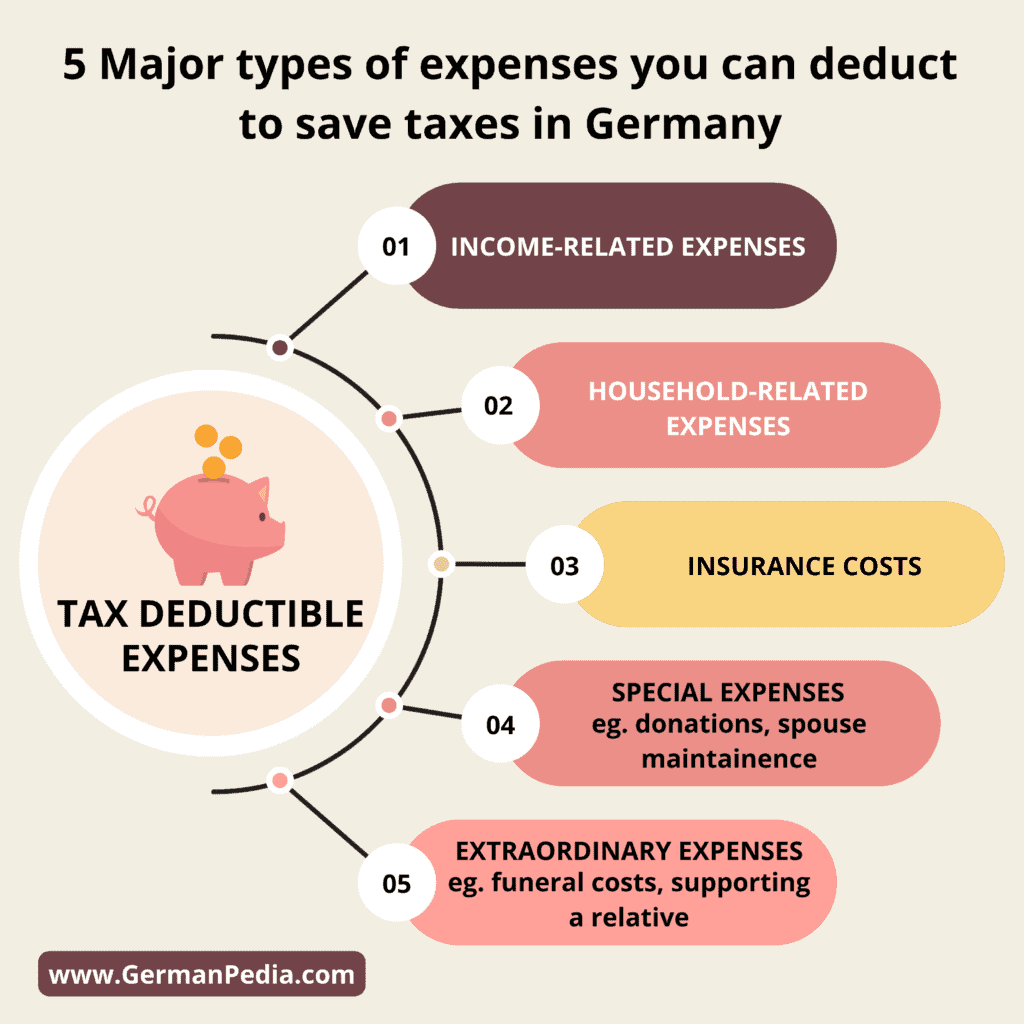
Income-related expenses are the most significant expenses employees can claim to recoup overpaid taxes.
The tax office deducts a flat rate of 1,200 € from employees’ income. Hence, reducing your taxable income further.
Moreover, if your professional expenses exceed the default lump sum (1200 €), you can use them to reduce your tax liability.
Thus, collecting professional expense receipts from the beginning of the year is advisable.
Income-related expenses
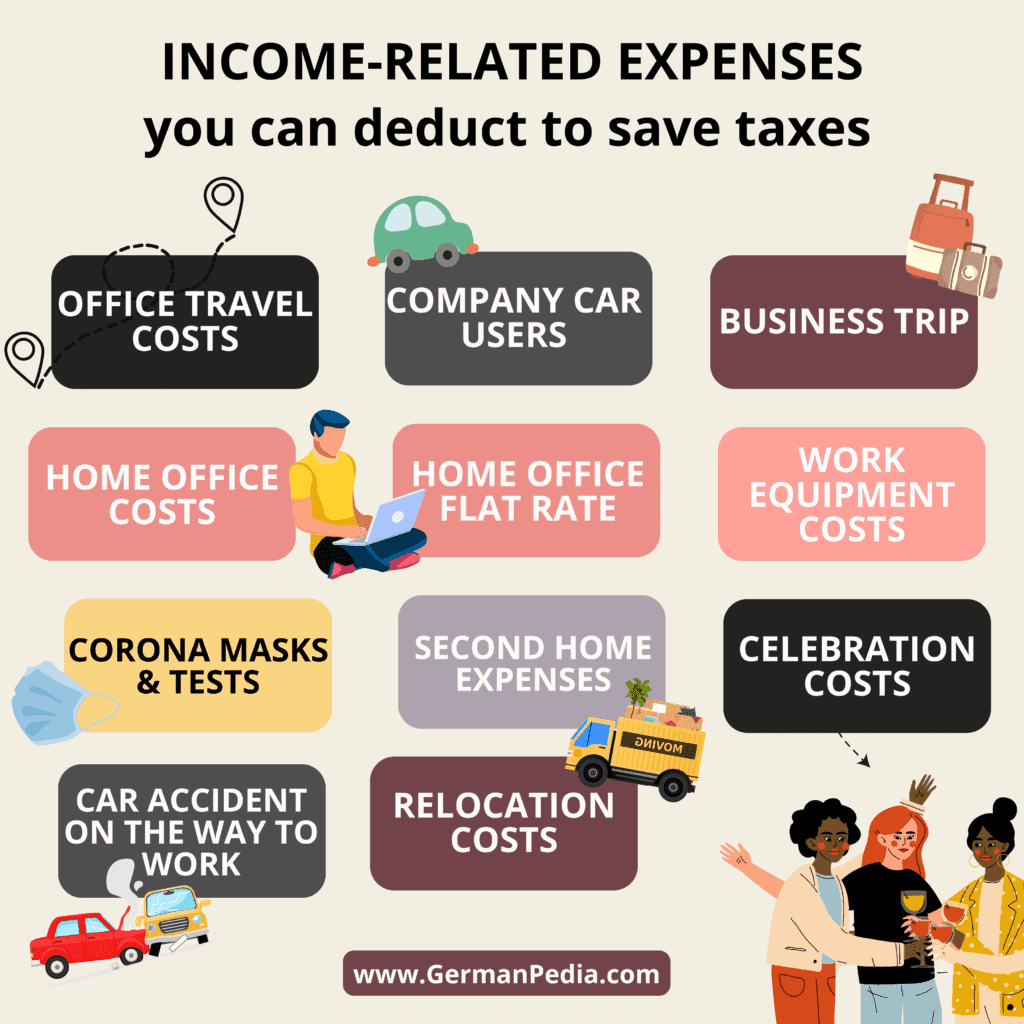
Costs of travel to the office
If you are an employee who commutes to work daily, you may be eligible to deduct travel costs from your income.
The tax office calculates travel costs based on the distance flat rate of 30 cents per kilometer .
For example, if you drive 18 kilometers to work 230 days a year, your travel costs would be €1,242 (80 * 0.3 * 230 = 1242 €).
The German tax office accepts
- 220 to 230 days for the distance allowance (Entfernungspauschale in German) with a five-day working week
- and 50 days more for a six-day working week .
You can find a state-specific working day calculator on this website (German).
Long-distance commuters enjoy increased travel allowance, i.e., 38 cents starting from 21 kilometers .
How do you claim costs?
When completing Appendix N, you must state the actual number of days you went to work.
Keeping a calendar of when you traveled to the office is the best way to keep track of your travel expenses.
If the tax office requests further information, you can submit your travel entries and an employer’s certificate.
Good to know
You can deduct the commuter’s flat rate for the working days you travel to the office. It’s independent of how long you stay in the office.
For example, you went to the office to attend a meeting and worked from home for the rest of the day. You can also deduct the commuter’s flat rate for this day.
The distance allowance applies regardless of the means of transport you choose. You can travel on foot, by cycle, train, or bus.
If you use public transport, you can either claim the distance allowance up to a maximum of 4,500 € or the actual travel costs if they are higher.
But you must be able to provide proof to claim for higher travel costs.
Company Car users
You can reduce your tax burden via individual assessment (Einzelbewertung in German) if
- you have a company car that you can use for private purposes
- and drove the company car to work less frequently in 2023.
You can use one of the two methods to determine the tax benefits.
- The logbook (Fahrtenbuch in German)
- Or the flat 1 percent rule.
Under the method logbook, you must maintain the logs of your journies throughout the year. Later, you can submit the journey logs to the tax office as proof of your travel expenses.
You and your employer must decide which method to use at the beginning of the year.
The reason is the tax office does not accept the logbook if you create it at the end of the year. This is because the tax office believes the logbook is mostly manipulated in such cases.
Only employees have the option of an individual assessment.
Self-employed or tradespeople (BFH, judgment of June 12, 2018, Az. VIII R 14/15 ) cannot benefit from an individual assessment.
Business trip expenses
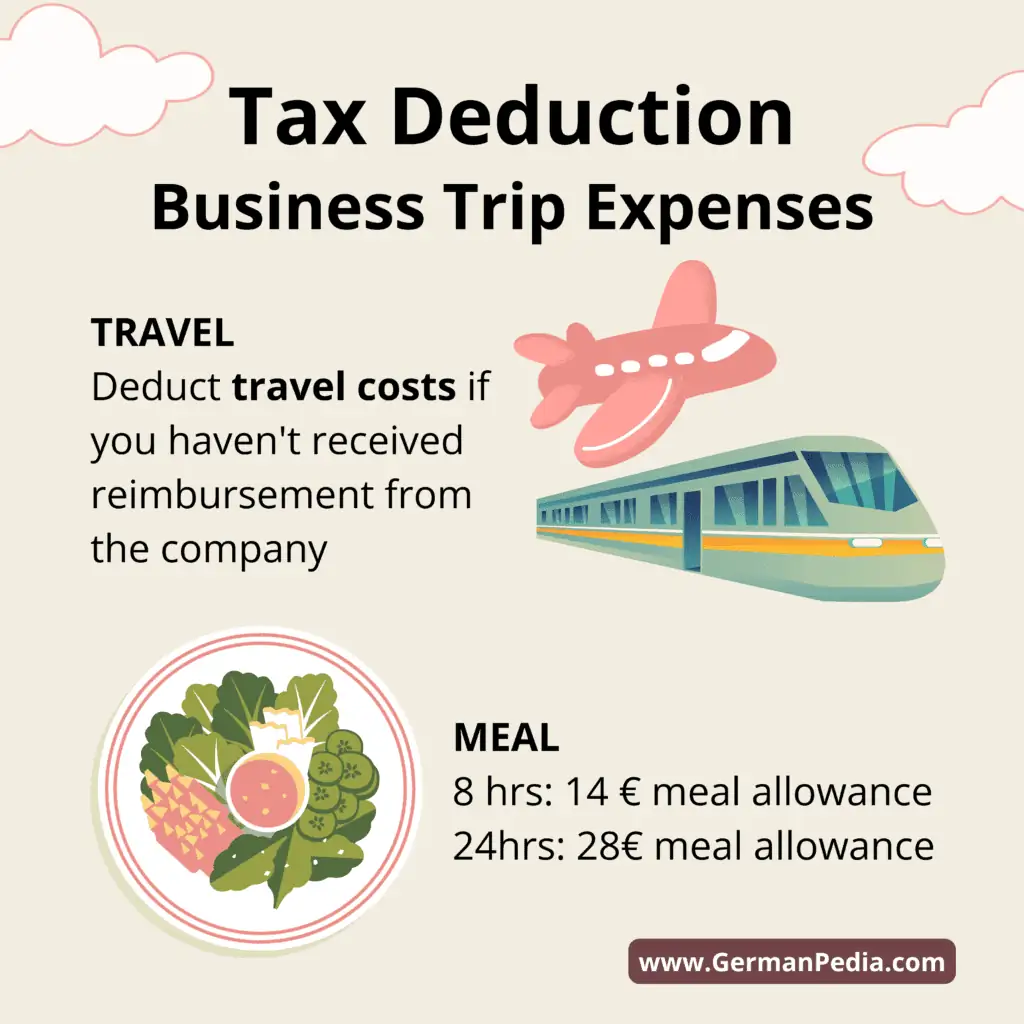
You can deduct the travel cost of business trips from your income if you haven’t received reimbursement from your company.
You would get 14 € as additional meal expenses if you were on the road for more than eight hours on a business trip.
The meal allowance increases to 28 € if your business trip lasts more than 24 hours.
The meal allowance increases further if you travel abroad. The increase depends on the country you travel to.
You can find a list of country-specific allowances in the Federal Ministry of Finance letter dated December 3, 2020.
There is also a flat rate for professional drivers who spend the night in their driver’s cabins. They can deduct 8 € per day as a meal allowance.
Home office cost
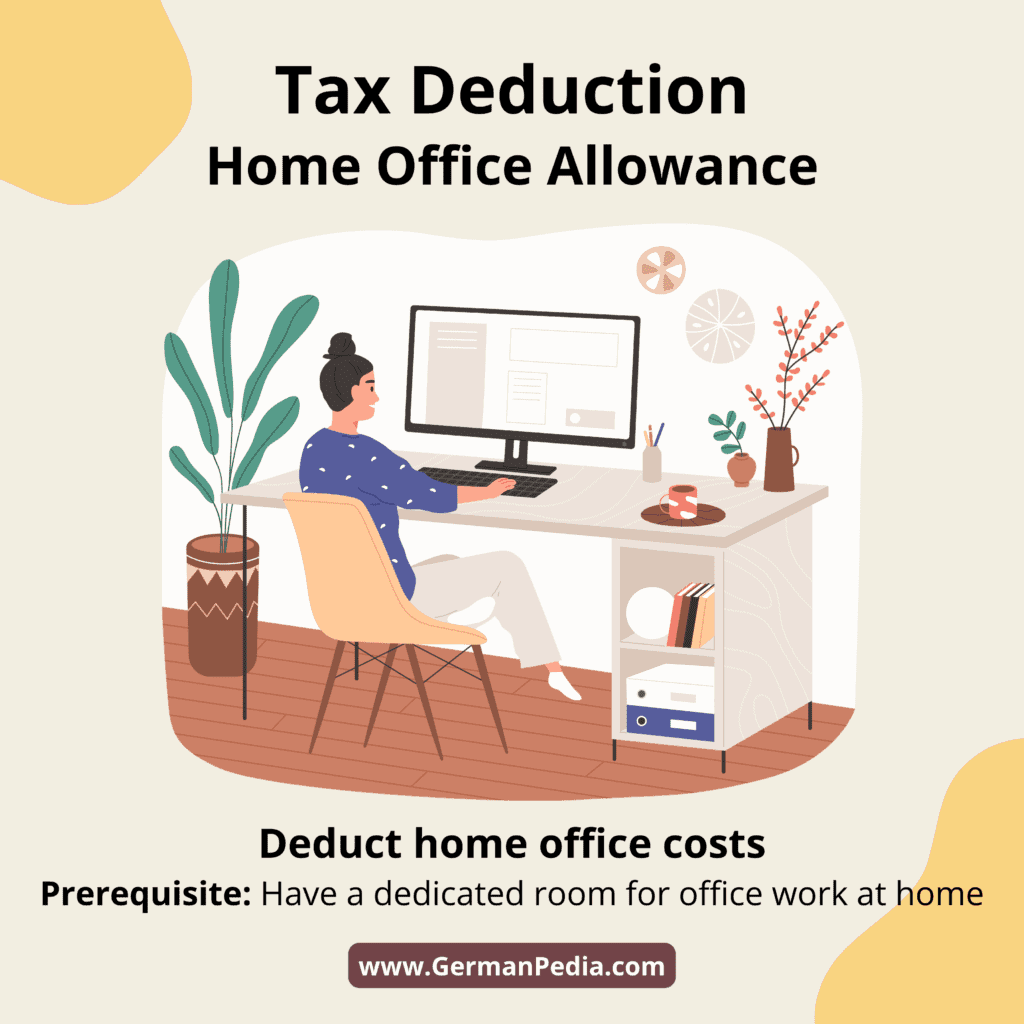
You can deduct all your home office costs from your taxable income. The only requirement is to have a dedicated room you use for office work at home.
The tax office has strict rules to determine whether you have a dedicated home office space. You may even have to provide proof to back it.
Suppose your employer does not provide a working space. In such a situation, the tax office limited the deductible to 1,250 € (for the 2022 tax year) and 1,260 (for the 2023 ta x year).
You don’t need proof to deduct the home office flat rate from taxes. Read our guide on home office tax deductions to learn more.
Home office flat rate (Homeoffice-Pauschale in German)
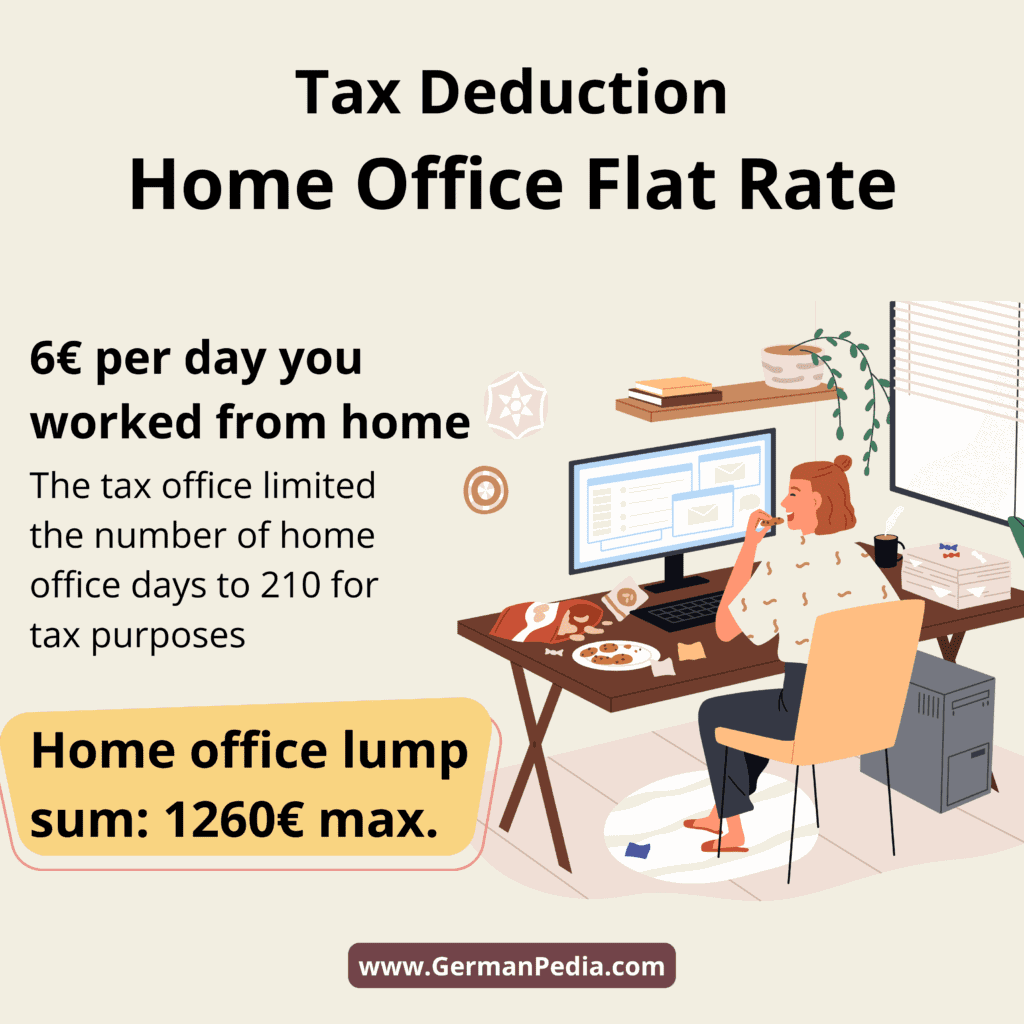
You can deduct up to 600 € (for the tax year 2022) from your taxable income as a home office flat rate. The tax office increased it to 1,260 € for the tax year 2023.
The home office flat rate benefits people who do not meet the strict requirements of a dedicated room for office work at home.
You can set 5 € (for the 2022 tax year) and 6 € (for the 2023 tax year) for each working day you work exclusively from home. The tax office limited the number of home office days to 120 (for the 2022 tax year) and 210 (for the 2023 tax year) for tax purposes.
Thus, the home office lump sum is limited to 600€ (for the 2022 tax year) and 1,260€ (for the 2023 tax year).
The tax office considers the home office flat rate to be income-related expenses. Hence, they offset the “home office flat rate” against the “employee flat rate” of 1,230 €.
Thus, you will enjoy the additional tax benefits from the home office flat rate if your income-related expenses exceed the employee flat rate of 1,230 €.
Costs related to work equipment (Arbeitsmittel in German)
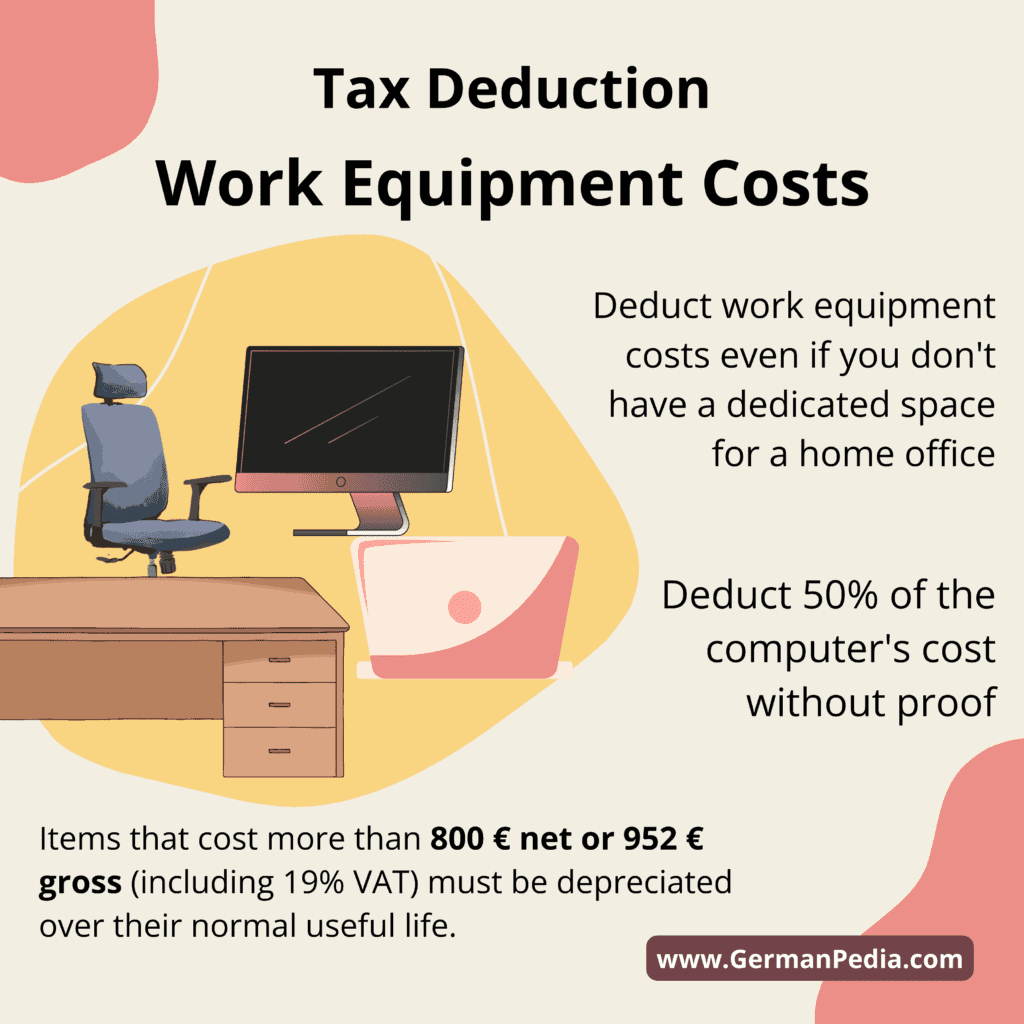
You can deduct the costs of the work equipment (e.g., office chair, printer, computer, etc.) you bought from your income tax.
Moreover, you can deduct the work equipment costs even if you don’t have a dedicated space for a home office.
You can deduct the complete costs of the items you used at least 90% professionally.
Without proof, the tax office allows you to deduct 50% of the computer’s cost from your taxable income.
But you can deduct 100% of your computer’s cost if you use it at least 90% for office work. But, of course, in this situation, the tax office may ask for proof.
NOTE : Items that cost more than 800 € net or 952 € gross ( including 19% VAT ) must be depreciated over their normal useful life. It is called Geringwertigen Wirtschaftsguts (GWG) in German.
Corona masks
You can deduct the costs of the Corona masks you wore at work.
But as we also use masks privately, it isn’t easy to differentiate between private and work use. Thus, the tax office may refuse you a tax deduction.
Nevertheless, you should include the cost of Corona masks in your income-related expenses. Primarily if you work a lot from the office and use public transport to get there.
Corona tests
You can deduct the costs of the Corona tests from your taxable income if you fulfill the following conditions.
- Your employer requested the test
- You paid for the test yourself
- And you didn’t get a reimbursement from your employer
While filing the tax return, you can put the Corona tests’ costs under income-related expenses.
Other income-related expenses (Weitere Werbungskosten in German)
You can enter other expenses related to your work in Appendix N from line 47.
They may be
- application costs
- travel expenses for business trips not reimbursed by the employer
- cost of books that you professionally need
- double housekeeping
File and Save Income Tax in Germany

- Follow the steps and fill in your data to see how much tax you can save.
- It is a cheaper way to file income tax than hiring a tax advisor.
- Get tax-saving tips to maximize your tax return in the current and the following years.
Second home expenses at the place of employment ( Zweitwohnung in German)
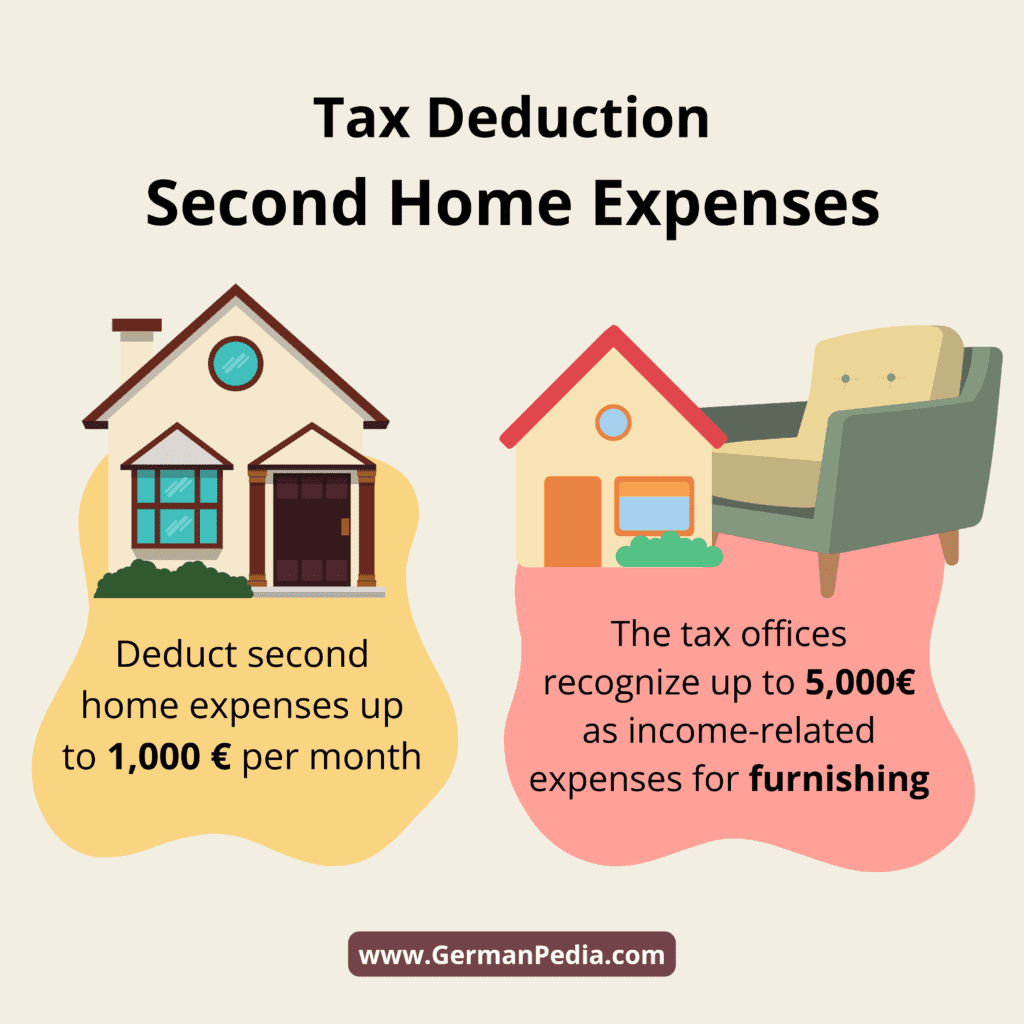
You can deduct the second home expenses up to 1,000 € per month from your taxable income.
The expenses could be
- Rental costs
- Ancillary costs
- House tax on the second home
On top of the above expenses, you can also deduct the costs of furniture, lamps, curtains, etc.
The tax offices recognize up to 5,000€ as income-related expenses for furnishing and equipping the second home.
Moreover, you don’t have to provide proof of furnishing expenses up to 5000€ (Federal Ministry of Finance letter dated November 25, 2020, text number 108).
You can also deduct work equipment, telephone, and internet costs. Of course, if your employer doesn’t reimburse the expenses.
Celebration costs ( Feierkosten in German)
You can deduct the cost of celebration with your colleagues in your company from the taxable income.
You can even claim entertainment expenses (Bewirtungskosten) under certain conditions.
The tax office recognizes account management fees of up to 16 € without proof.
Car accident on the way to work
If you have a car accident on the way to work, you can deduct all the non-reimbursed costs from your tax return.
These can be
- car repair costs you bear yourself,
- damage to clothing and objects,
- medical expenses,
- travel expenses to doctors and workshops,
- legal, court, and expert costs,
- expenses for rental cars as well as salvage and towing costs.
Moving costs (Umzugkosten in German)
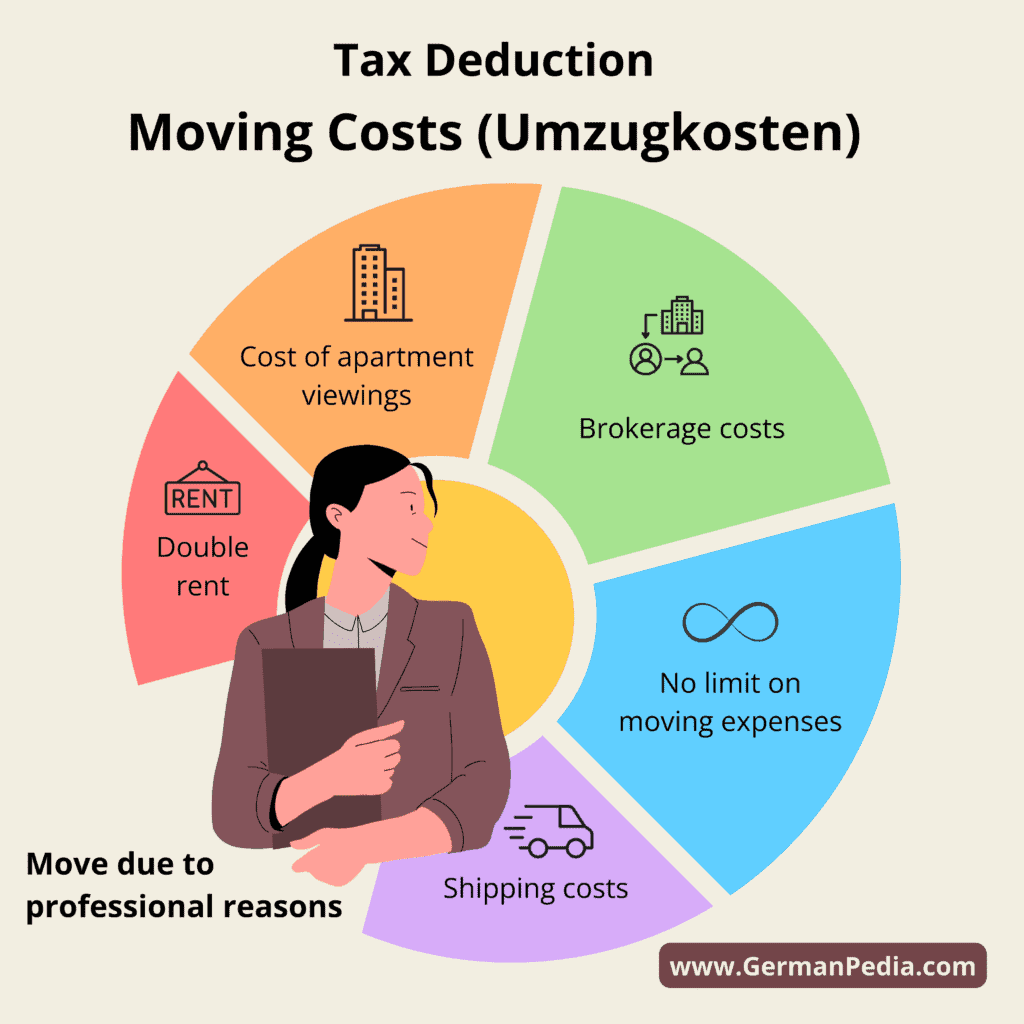
Professional reasons
Moved to a new city or changed residence within the same city?
You can claim the moving costs as income-related expenses for tax purposes. But the move should be for professional reasons .
For example,
- move to work as a young professional,
- changed jobs
- were transferred by the employer or
- your daily commute to work has been shortened by at least one hour due to the move.
You can submit the following travel costs for tax deductions.
- Cost of apartment viewings,
- brokerage costs,
- shipping costs,
- double rent, etc.
The tax office puts no limit on moving expenses. You can deduct all the costs during tax declaration as long as you have the proof.
You can apply for a flat-rate relocation fee in your tax return if you don’t have proof of expenses.
The tax office revises the relocation flat rate every year. Thus, the date you moved determines which relocation lump sum applies to you.
Moreover, you can apply for a tuition fee lump sum in your tax return if your child needs private tuition because of moving to another federal state.
Private reasons
You can deduct 20% of the labor and travel costs if you move for personal reasons.
In this case, the relocation expenses come under the “household-related service” (haushaltsnahe Dienstleistung in German) category.
If you must move for health reasons, you can submit the expenses as an “extraordinary burden” (außergewöhnliche Belastung in German).
Household related expenses
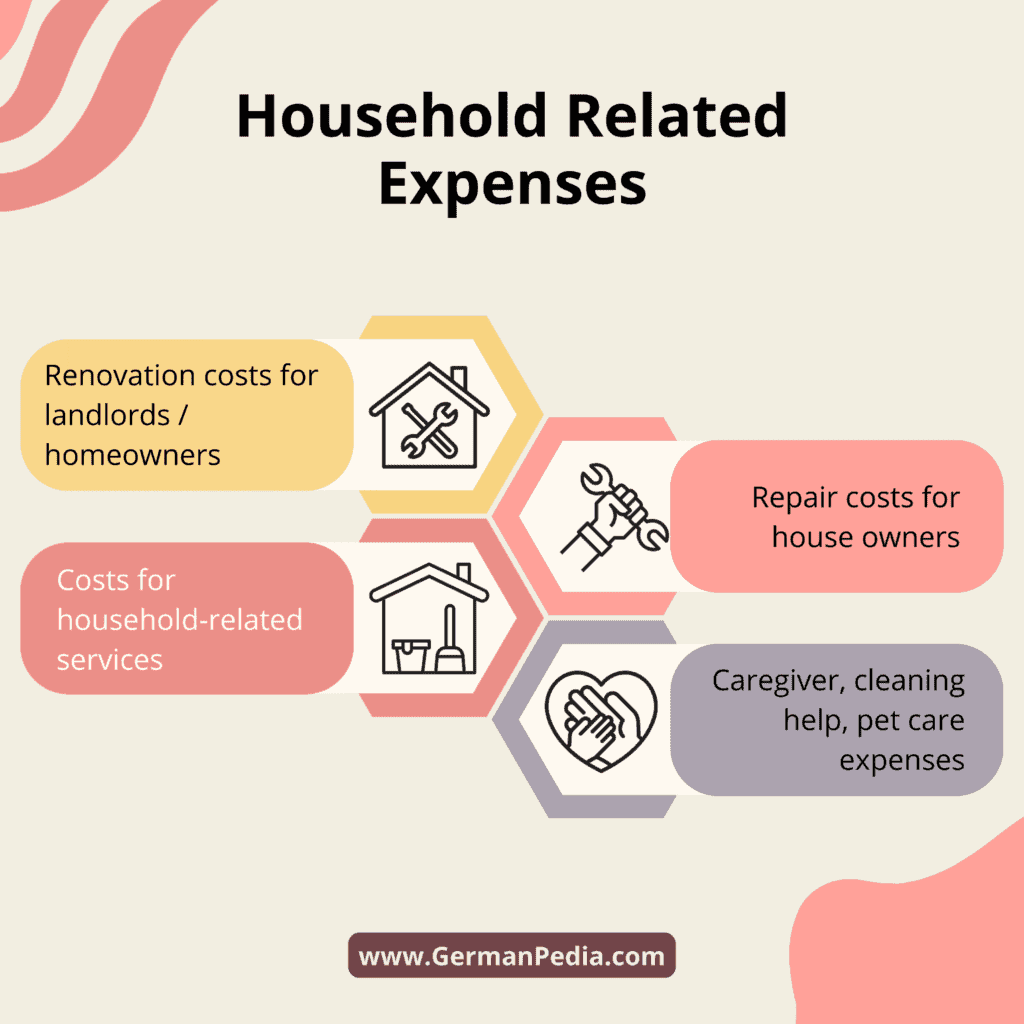
Renovation costs for landlords/homeowners
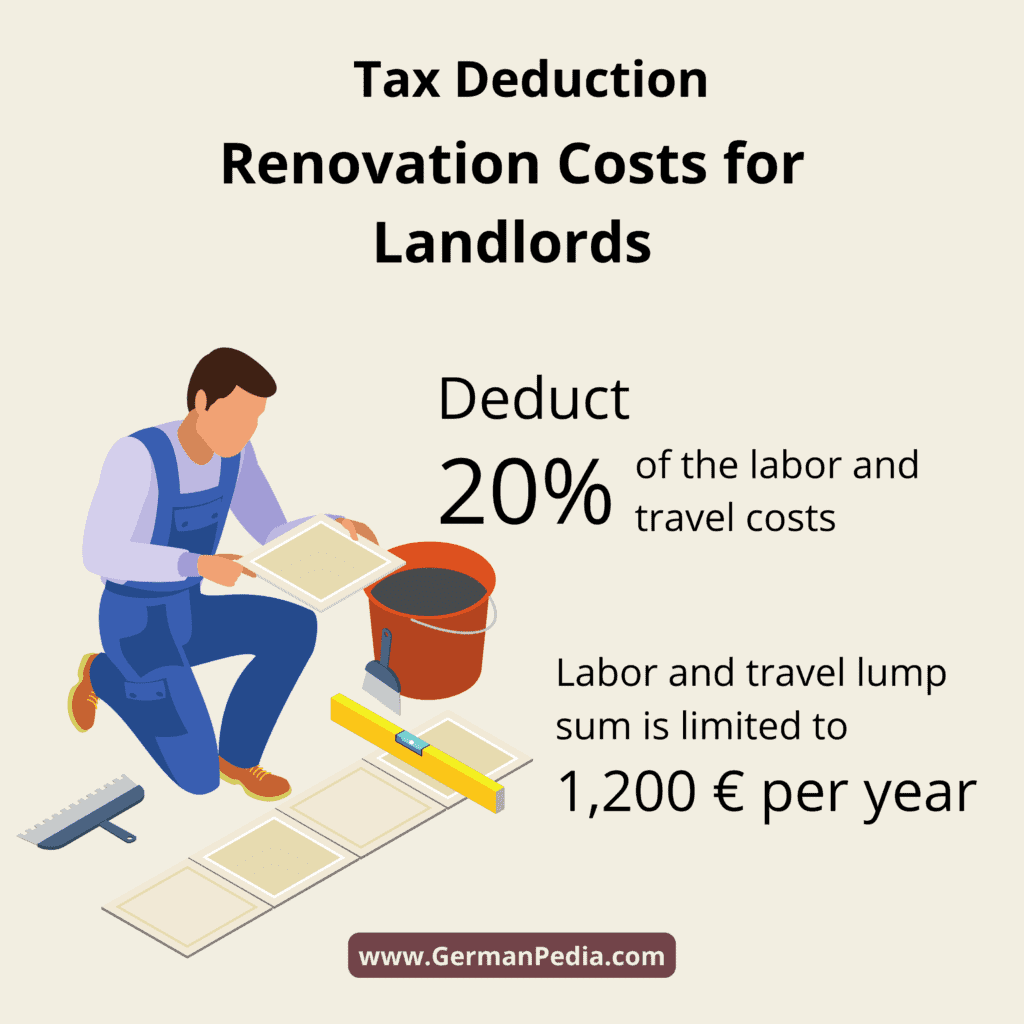
When filing a tax return, you can deduct an apartment’s renovation, repair, and assembly costs from your income.
- You can enter labor expenses (Handwerkerarbeiten in German) in your tax return.
- You get back 20% of the labor and travel costs as a tax rebate. The tax office limited the labor and travel lump sum to 1,200 € per year. Thus, you can state labor and travel invoices up to 6,000 € (20% of 6k = 1200 €).
- The craftsman’s equipment costs are also tax deductible but not material expenses.
NOTE : You must have invoices for all the costs incurred . And you pay the invoice via bank transfer instead of cash .
Other tax-deductible repair costs for house owners

According to a letter from the Federal Ministry of Finance (Bundesfinanzministeriums (BMF) in German) dated November 9, 2016, tax officials must also recognize the following items:
- Drain pipe cleaning
- Certain expenses for an expert, for example, for measurements on a stove, a gas boiler, or oil heating
- Leak test on sewage pipes
- Legionella test
- Complete chimney sweep costs
- TÜV control at the elevator
- Checking a lightning protection system
- Maintenance of the heating system
On page 25, the BMF letter lists which costs are eligible for a tax deduction. The letter also mentions which expenses fall into the category of craftsmen’s or household-related services.
Tenants may also deduct costs for household-related services
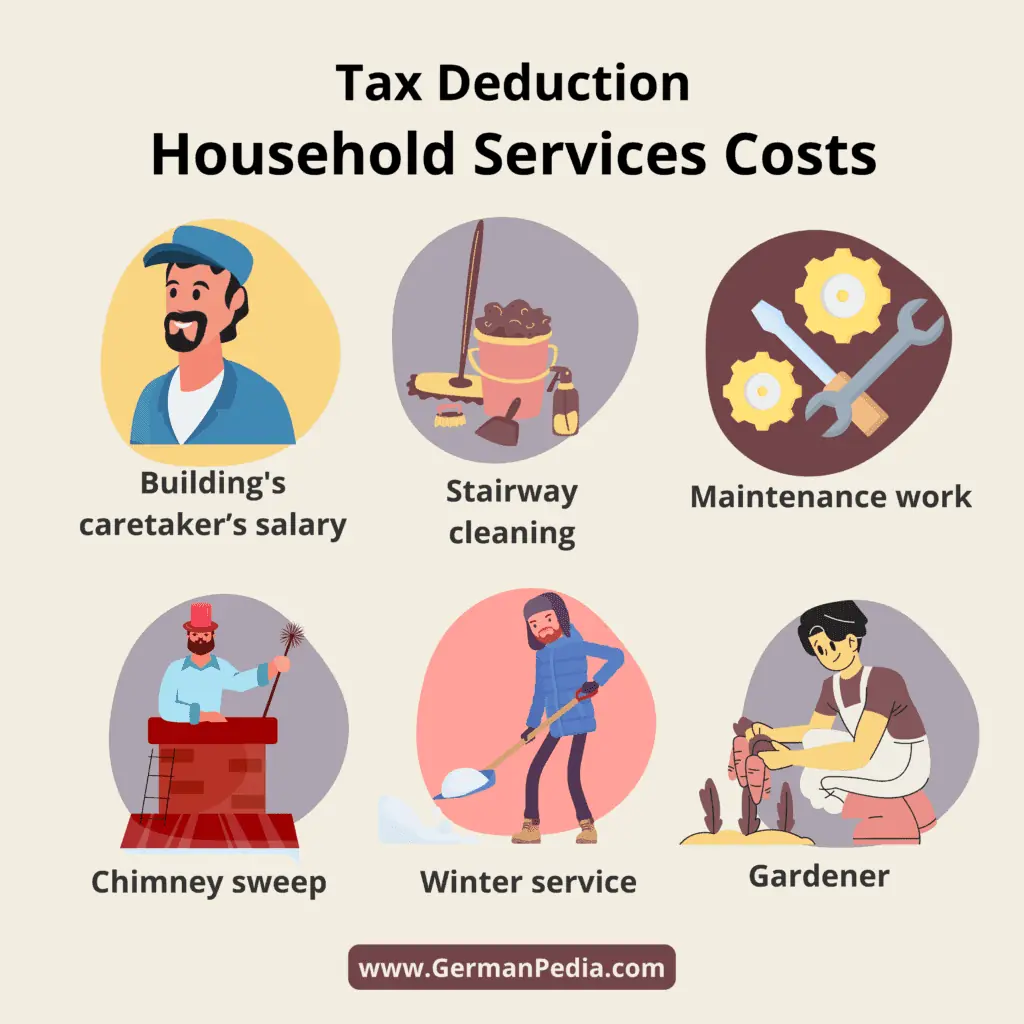
Tenants can enter all the labor costs for house repair or household-related services in their tax returns.
Usually, landlords transfer some of the house repair costs to the tenants. The landlords put such expenses in the utility bill. And you can enter these expenses in your tax return.
The household-related expenses could be
- expenses for the building’s caretaker (Hausmeister Service in German),
- stairway cleaning,
- the gardener,
- the chimney sweep,
- maintenance work or winter service, etc.
For the 2023 tax return, you can use the 2022 “service charge statement” (Nebenkostenabrechnung in German) that you received in 2023.
Caregiver, cleaning help, pet care expenses
You can deduct the following costs during your tax return.
- Caregiver expenses
- Cleaning help costs
- Costs related to the care of your cat or other pet
- According to current case law, the costs for a dog walk service can also be included
You must have the invoices for the costs incurred.
You can get back 20% of the total costs incurred. But the tax office put a limit of 20,000 € on such expenses. Thus, you can get a maximum of 4,000 € (20% of 20k) in a tax refund.
On top of it, you can get a tax refund of up to 510 € if you employ the household help as a mini-jobber.
Thus, you can get up to 4510 € (4000 € + 510 €) via the tax return.
Insurance costs
Deduct social security contributions, insurance, and pension schemes.
You deduct the following insurance contributions during tax declaration.
- pension insurance (Rentenversicherung in German)
- health insurance (Krankenversicherung in German),
- long-term care insurance (Pflegeversicherung in German),
- unemployment insurance (Arbeitslosenversicherung in German)
You can fully deduct the contributions to the statutory health insurance (without optional supplementary benefits).
Similarly, you can deduct contributions to private health insurance . However, the tax office accepts contributions to basic coverage only.
If you paid for your child’s health and nursing care insurance, you can deduct it from your income tax.
Other tax-deductible insurances
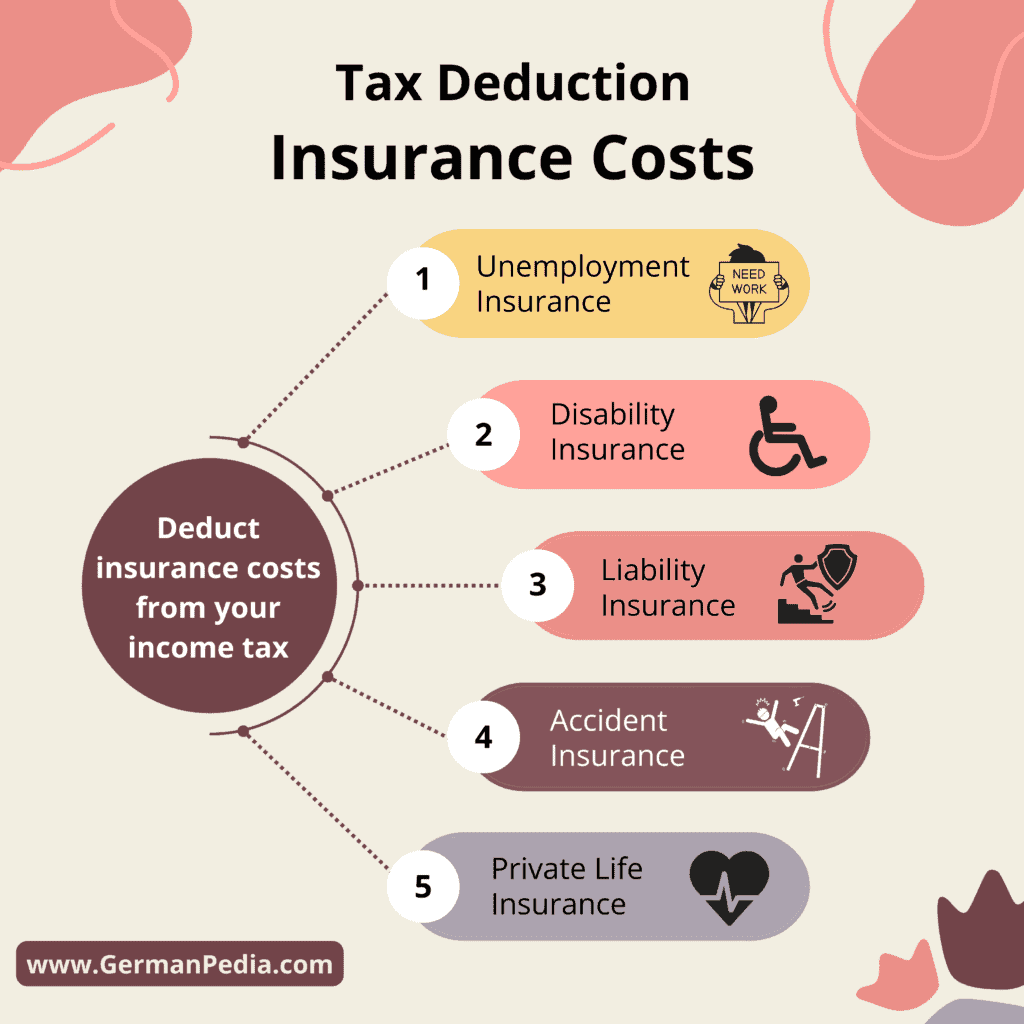
The following insurances are also tax deductible if you took them before 2005.
- unemployment insurance (Arbeitslosenversicherung in German),
- disability insurance (Berufsunfähigkeitsversicherung in German),
- liability insurance (Haftpflichtversicherung in German),
- accident insurance (Unfallversicherung in German),
- and classic private life insurance (Privat Lebensversicherung in German).
If you took any insurance because of your job or business, you could deduct the contributions as income-related or operating expenses (for the self-employed).
For example, professional liability or accident insurance if you travel frequently for your company.
Deduct contributions to pension plans ( Altersvorsorgeaufwendungen in German)
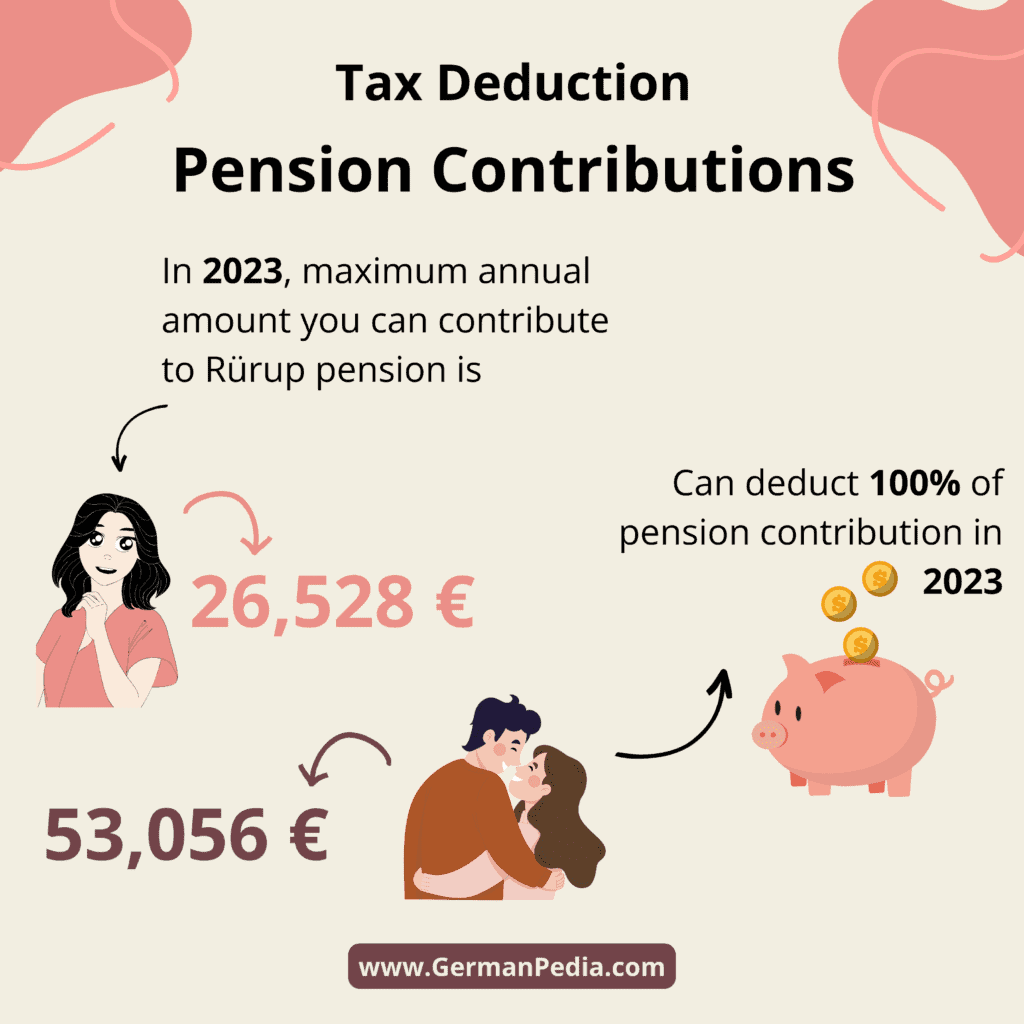
You can also deduct the contributions to professional pension schemes or Rürup contracts.
In 2023, you can deduct 100% of your paid contributions while filing tax returns.
In 2023, the maximum annual amount you can contribute to your Rürup pension is
- 26,528 € for a single person, and
- 53,056 € for a married couple filing jointly.
And you can deduct all of it from your income tax return.
NOTE : The tax office deducts the tax-free employer’s contribution from the pension contributions while calculating the tax returns.
Riester savers
Do you have a Riester contract ? If yes, you can enjoy both; the Riester allowances and the tax benefits.
For those who don’t know what Riester is – it’s one of the many pension plans you can opt for in Germany.
The German government gives allowances to the people to support the Riester plan. These allowances are deducted before you make a Riester contribution.
For example, your annual contribution is 2100 €. You are eligible for a basic allowance, i.e., 175 €. Thus, your annual contribution amount reduces to 2100 – 175 = 1925 €.
On top of it, the tax office allows you to deduct the Riester contributions from your tax returns.
Annual allowances from the German government
You will get the following annual allowances from the German government.
- Basic allowance of 175 € per annum
- If you have kids, you get an allowance of 300 € (kids born after 2008) or 185 € (kids born before 2008) per kid per annum .
Minimum contribution amount
To be eligible for the allowances by the government, your annual Riester contribution should be at least 4% of your gross annual income.
For example, you earned 70,000 € gross last year. Then you must pay 4% of 70k, i.e., 2,800 € into your Riester account in the new year.
The insurance company automatically deducts the state allowances you are eligible for from your contribution. Hence, you only pay the remaining amount yourself.
Tax deductions
You can deduct the Riester contributions you made while filing your tax return.
The tax office limited the Riester contribution amount you can deduct during the tax return to 2100 €.
Thus, if your Riester contribution was 2800 €, you can deduct 2,100 € only.
On top of it, the tax office subtracts the allowances from your Riester contribution amount while calculating the taxes.
So, if you received only the basic allowance of 175 €, the tax office would deduct it from 2100 € for tax calculation purposes.
In other words, you save tax on the amount you actually contributed.
Different scenarios based on your situation
Special expenses
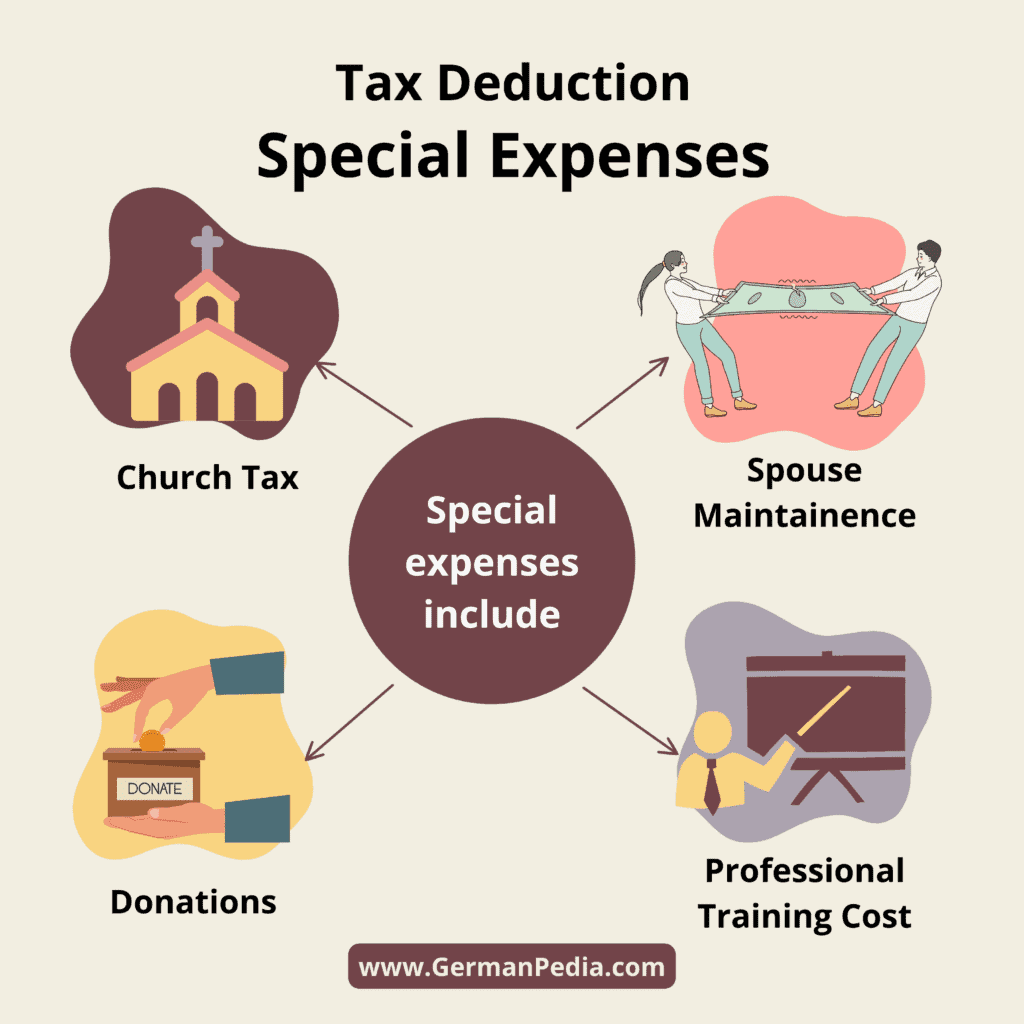
The tax office considers special expenses up to 36 € (72 € for married couples or registered life partners who file tax returns jointly).
The special expenses include
- Professional training expenses
- Maintenance payments to the ex-partner (“Unterhaltszahlungen an den Ex-Partner” in German).
Save tax as a student
While filing the tax return, you can deduct your tuition fee as a special expense. The prerequisite is that you start studying immediately after high school.
However, the tax office limited the amount you can deduct to 6,000 € per year.
You can also deduct the costs of further studies (e.g., master’s degree) as anticipated income-related expenses.
You also have the option to carry forward the study costs to later years. Hence enjoying the tax benefits in the future.
Deduct maintenance payments
You can deduct the maintenance payments you paid to your ex-partner. The tax office allows you to deduct up to 13,805 € as a special expense .
You can also claim the health and nursing care insurance costs (at least the basic protection) you paid for your ex to save taxes.
You enter the payment amount in the attachment, “special expenses” (Anlage Sonderausgaben in German), and in attachment U in section A.
In section B of attachment U, you need the payee’s (your ex’s) signature and tax identification number . This procedure is called Realsplitting in German.
If your ex refuses to sign section B of attachment U, the alternative is the deduction as an extraordinary burden.
But unfortunately, the maximum amount you can deduct in this situation is 10,908 €.
Deduct donations as special expenses .
You can deduct donations to a non-profit organization from your income to save taxes.
The tax authorities limited the tax-deductible donation amount to 20% of your total income. In addition, you must provide a donation receipt issued by the recipient to enjoy the tax benefits.
The tax authorities honor the donation to the following entities.
- Non-profit organizations
- Legal entities under public law, such as a university.
Every donation receipt pays off because special expenses reduce the taxable income as soon as they exceed the flat rate of 36 € (72 euros for jointly assessed persons).
A bank statement is usually sufficient proof of donations and membership fees of up to 300 €.
You can also use a bank statement as proof of more than 300 € donations. But, the payment must go to a special account (Sonderkonto in German), and you must pay it within a fixed period.
Donations to political parties
You can deduct half of the donations to political parties from your tax liability .
The tax office limited the amount to 825 € per year for individuals and 1,650 € for partners filing tax returns jointly.
Childcare expenses
You can deduct 2/3 of the childcare expenses per year per child as special expenses. However, the tax office limited the amount you can deduct to €4,000 per child.
The child must be part of the taxpayer’s household and below the age of 14.
Parents of children with disabilities
Parents of children with disabilities can deduct childcare expenses even if the child is older than 14.
The prerequisite is that the child cannot support themselves because of a disability that occurred before the age of 25.
Extraordinary expenses
Deduct medical expenses from your taxes ..
Depending on your income, marital status, and the number of children, you can deduct the medical expenses as extraordinary burdens (außergewöhnliche Belastungen in German).
The tax authorities consider medical expenses only if they exceed a reasonable amount.
The most common high medical expenses include glasses, dentures, physical therapy, and acupuncture .
You can also deduct
- the hospital and medical expenses,
- expenses for drugs prescribed by a doctor,
- the prescription fee,
- and travel expenses to doctors, hospitals, and pharmacies.
Thus, keep the receipts of your medical expenses to save taxes.
Besides that, you should also consider taking supplementary health insurance. The most important one is supplementary dental insurance to cover expensive dental treatments.
Funeral expenses
If a loved one dies and you pay for the funeral expenses, those expenses can be deductible. However, the costs must exceed the inheritance.
Cost of supporting a relative in need
You can deduct up to 10,908 € (in 2023) to support the people in need.
For example, supporting
- a destitute child for whom there is no child benefit (anymore),
- a relative, or your parents in need of care.
You can also claim contributions to basic health insurance and statutory long-term care insurance of the supported person if you paid them.
The tax office considers the recipients’ income, especially if the income is more than 624€.
German tax authorities consider a person in need if their net assets do not exceed 15,500 €. A self-used property is not considered an asset.
You enter the support expenses in the Extraordinary Expenses attachment (Anlage Außergewöhnliche Belastungen in German).
Cost of civil proceedings
Since 2013, you can no longer deduct the costs of civil proceedings. This includes divorces.
One exception is if you have to conduct a legal dispute to safeguard your economic livelihood.
In this situation, you can deduct all the legal and court expenses you spent to secure your vital income.
You can learn more about legal and court expenses in our guide on legal insurance in Germany .
Volunteering while being financially compensated
For volunteer work, you can accept
- Trainer flat rate (Übungsleiterpauschale in German) – up to 3000 € per year tax-free for volunteering as a trainer.
- Volunteering allowance (Ehrenamtsfreibetrag in German) – up to 840 € a year tax-free for volunteering in a non-profit organization.
You must enter the income from a part-time job or volunteering in Appendix N or Appendix S.
You can save taxes by using both flat rates. But not for the same activity.
Thus, you can enjoy tax benefits from both; the “trainer flat rate” and “volunteering allowance” if you hold multiple posts, remunerated separately.
For example, if you work as a trainer for a sports club and also look after the club’s treasury.
NOTE : Appendix N applies if an association employs you. However, you must submit Annex S if you are self-employed.
Loss from an investment
There are special rules for compensating for losses from an investment.
Here are a few points to consider
- If your expenses exceed your income in a year, you can carry the loss back to the previous year or forward to the following years.
- If you sell an investment at a loss, you can never offset this against other income , such as wages, pensions, or rentals.
- If you sell shares at a loss , this can only be offset against a profit from share transactions .
- If you sell investments (apart from stocks and futures) at a loss, you can offset this against other investment income – including a profit from the sale of stocks.
You can learn more about capital gain taxes in Germany here .
References:
- https://www.brutto-netto.de/wissen/steuern/altersvorsorgeaufwendungen/
- https://www.finanztip.de/steuererklaerung/
Categories:
The information provided in this post is based on our own experience and in-depth research. The content of this post might be inaccurate. It should not be considered financial, tax, legal, or any kind of advice.
We are not certified brokers or consultants. Always do your own research and contact certified professionals before making any decision.
We finance our extensive work via affiliate links. Thus, some or all of the links in the post might be affiliate links.
We get money if you click on such a link or conclude a contract with the provider without costing you a cent extra.
All links marked with the “*” are affiliate links.
Other useful guides
Is your child ready for school in germany, requirements to enter gymnasium in germany, private vs public schools in germany, motor vehicle tax in germany [2024 english guide], car theft coverage by car insurance in germany, is voluntary tax return worth it in germany [2024 guide], home insurance in germany | insure household contents, drone liability insurance in germany [2024 english guide], best dog liability insurance in germany [2024 english guide], employer refuses to pay wages: employees right in germany.

Subscribe to get free welcome kit
The welcome kit contains
- Links to important guides at one place
- Tips to save money every year
- Tips to earn money in Germany
- Know your rights as a tenant
- Cheatsheet on saving taxes
- NETHERLANDS
- SWITZERLAND
Expat Info Articles

7 tax allowances and deductions you should know about in Germany
German tax law allows for numerous lump sums, tax allowances and deductions that you can use to decrease your taxable income and generate huge tax savings. Many of them don’t even require proof or receipts – and sometimes you can deduct the full amount even if your expenses aren’t that high! Natascha Manthe from wundertax walks you through the seven most important tax rules all expats in Germany should know about.
Want to save money on your tax bill? Make sure to take advantage of these allowances and deductions on your annual tax return!
1. Income-related expenses lump sum
The German tax office grants a 1.000-euro (in 2021) income-related expenses lump sum ( Werbungskostenpauschale ) that you can deduct for any costs incurred through your work. From the 2022 tax year onwards, this lump sum will be increased to 1.200 euros per year.
It’s automatically deducted from your taxable income, so you don’t need to provide any proof or receipts - even if your actual expenses don’t add up to this amount. If you exceed the lump sum with travel expenses, work equipment, further education, home office expenses, and so on, the costs can be deducted individually - and you will need to provide proof.
It’s worth noting that, if you didn’t work the entire year, you’ll only receive the full lump sum for income-related expenses if you file a tax return!
2. Basic tax-free allowance
The basic tax-free allowance ( Grundfreibetrag ) ensures that you only pay income tax on your annual income above a certain threshold. In 2021 the basic tax-free allowance is 9.744 euros and will be increased to 10.347 euros in 2022.
The same rule applies here: if you haven’t worked the entire year, you can reclaim taxes by submitting your tax return.
3. Commuter allowance
If you commute to work, you can claim 30 cents per full kilometre of your commute with the commuter allowance ( Entfernungspauschale ). From 2021 onwards, long-distance commuters will also receive 35 cents per kilometre from the 21st kilometre of one-way travel and this will increase again to 38 cents from 2022 onwards. Please note that the allowance can only be claimed one way, so either for your outward or return trip.
The commuter allowance can be claimed regardless of which form of transportation you use. Whether you commute by public transport, bike, in a carpool, or even on foot, you can claim the 30 cents per kilometre!
4. Home office lump sum
Are you one of the 25 percent of all professionals who worked from home in 2021? If so, you can benefit from the home office lump sum ( Home-Office-Pauschale ): a lump sum of 5 euros per day worked from home that can be claimed on your tax return - up to 120 days per year!
If you worked from home for (at least) 120 days, you already have 600 euros in income-related expenses in your pocket. You can easily exceed the income-related expenses lump sum, for example, by claiming the commuter allowance for the days you worked from the office.
The home office lump sum can also be used by freelancers and self-employed people. In this case, the lump sum is deducted as a business expense.
5. Save taxes with volunteer work
As of January 1, 2021, anyone who takes part in volunteer work or volunteers as an exercise leader in Germany can save more money on their tax return. The volunteering allowance ( Ehrenamtspauschale ) has been increased to 840 euros, and the lump sum for exercise leaders ( Übungsleiterpauschale ) has been increased to 3.000 euros per year.
These lump sums can be claimed for your part-time volunteering commitment without you having to pay tax or social security contributions on them.
6. Lump sums for additional moving expenses
You can also claim expenses incurred from moving for professional reasons on your tax return, as income-related expenses. There is, however, a distinction made between “general moving costs” ( allgemeine Umzugskosten ) and “additional moving costs” ( sonstige Umzugskosten ).
General moving costs such as moving company expenses, forwarding agencies, and doubled rent payments can be deducted in full if you provide proof.
Additional moving expenses can be deducted as a lump sum without providing any proof, even if the expenses were low. From April 1, 2022, the moving allowance is 886 euros for the eligible person and 590 euros for each additional household member.
Additional moving expenses include, but are not limited to, expenses incurred from:
- Newspaper advertisements
- New telephone connections
- Vehicle re-registrations
- Trips to various authorities
- A portion of the costs of renovation / cosmetic repairs at your old residence
- Tips / meals for movers
- Curtains, curtain rods, and blinds
- Light installations in your new residence
- Dismantling / installing household appliances
- Registering your child(ren) at a different school
7. Special expenses
Certain costs incurred in your private life can also be categorised as special expenses ( Sonderausgaben ) and claimed on your tax return. The tax office automatically grants a 36-euro lump sum for special expenses (or 72 euros for married couples filing a joint tax return), but this lump sum can easily be exceeded with other kinds of expenses, for instance:
- Retirement provisions : Contributions to statutory and private retirement insurance funds, occupational pension provisions, Riester and Rürup pension plans
- Insurance : Contributions to health insurance, long-term care insurance, additional insurance such as accident, liability or employment, and occupational disability insurance
- General special expenses : Alimony, childcare expenses, church tax, donations, educational fees, initial vocational training costs
Not only do lump sums, allowances and flat rates simplify your tax return by allowing you to deduct expenses without having to provide any proof or receipts, but they also allow you to claim back tonnes of taxes as well! And with wundertax’s user-friendly interface , claiming deductions couldn’t be simpler. Get started today to secure an average tax refund of 1.072 euros.

Natascha Manthe
Natascha works as a Content Manager at wundertax. She loves to dive into tax topics and put them into easy-to-understand form. The other half of her heart belongs to acting:...
JOIN THE CONVERSATION (1)
Leave a comment

LisaMarkinson2 15:32 | 10 April 2023
Thanks for sharing this article on tax allowances and deductions for expats in Germany. As someone who is new to the country, navigating the tax system can be overwhelming, so it's great to have resources like this to help me better understand what I'm entitled to. However, my issue is that I wouldn't like to track all of this myself. I recently came across Richmond Blackwood (https://www.richmondblackwood.com/en) who offer personal expense management and tax optimization services for high-earners like myself. Have you spoken to them by any chance? I'm intrigued and plan to reach out to them soon to see if they can help me make the most of my finances in Germany.

Tax return Germany | 49 deductible expenses
- share
What is Steuererklärung – income tax return Germany?
Steuererklärung – Germany tax return is a declaration by which those who are employed or have their own company (Gewerbe) in Germany present to the tax office (Finanzamt) their income and costs in real figures.
You can complete the Steuererklärung – your tax return in Germany either as a paper form or electronically.
After submitting your tax return in Germany, the tax office (Finanzamt) determines how much tax you have to pay as a taxpayer.
Furthermore, the Finanzamt will determine whether you still owe money to the tax authorities or whether you should get money back, depending on your expenses and type of income.
SteuerGo * has launched the online application for completing the Steuererklärung – Tax return in Germany in ENGLISH !
The link below will take you to the tax return calculator Germany, which can be filled out directly in English:
ONLINE HELP in ENGLISH for filling in the tax return in Germany Steuererklärung*
Who has to fill in the Steuererklärung – tax return Germany?
You will have to file tax return in Germany if in the year for which you are filing your tax return you have received:
- unemployment benefit (Arbeitslosengeld)
- sick leave paid by the health insurance fund (Krankengeld)
- short-time working allowance (Kurzarbeit)
- parental allowance (Elterngeld)
- financial aid from the employment office (Jobcenter)
You must also complete the tax return and submit it to the Finanzamt if:
- in that year you received salaries from several employers
- as spouses you have chosen income tax combination III/V or the factor has been entered for tax class IV
- if your spouse does not work in Germany, you will need to present the EU/EWR European Income Tax Form to the tax office (Finanzamt)
- whether tax exemptions are specified on the annual payroll tax slip (Lohnsteuerkarte)
- you remarried in the year of your partner’s death
- you remarried after getting divorced in the same year
- you have earned additional income or income subject to progressive taxation exceeding EUR 410
- if you have a certain degree of disability, if you receive a disability pension or sickness pension
- if you are a legal person, i.e. if you have your own company (Gewerbe), regardless of whether you work as an employee or not
- if your local tax office (Finanzamt) requires you to file a German tax return – Steuererklärung – even if you do not fall into any of the above categories
In addition to the above examples some other possibilities exist.
Why should you fill in the Steuererklärung – Germany tax return, even if you don’t fit into the above categories?
Even if you don’t have to file a Steuererklaerung – tax return in Germany, it’s worth doing.
Especially when you have deductible expenses (see below) you can almost always expect to get some of your tax back.
And sometimes the amounts can be very interesting.
What income is taxed in Germany?
According to steuern.de there are several types of income that are taxable and must be declared. This is income earned from:
- employment or self-employment
- in a company or commercial enterprise
- capital assets (interest, dividends, price gains on sale of shares and others)
- rent and lease, obtained in Germany. Income earned in this way, at least in an European Union country, is not taxed in Germany.
- state pensions or pensions provided by the companies you work for
- agriculture and forestry (obtained in Germany). The incomes obtained in this way in Romania are not taxed in Germany.
- special pensions, subsistence payments, parliamentary allowances and miscellaneous income from private sales transactions
Can income from inheritances or gifts be taxed?
Although this type of income does not fall under German tax law, it is subject to taxation (by a special law).
Is income from gambling (e.g. lottery winnings) taxed in Germany?
Income from gambling in Germany is not taxed.
So good luck with the money you win on the lottery!
Tax return Germany deadline
From 2018, the tax return Germany deadline depends if you seek the advice of a tax adviser in Germany or not:
Persons who are obliged to file a tax return and who do NOT seek the advice of a tax consultant/accountant (Steuerberater):
Steuererklärung – tax return in Germany must be filed by the end of July of the following year (e.g. 31.07.2021 for 2020 tax return)
Those who are obliged to file a tax return and who seek the advice of a tax consultant/accountant (Steuerberater):
Steuererklärung – the German tax return must be filed by the end of February in another year (e.g. 28.02.2022 for the 2020 tax return)
Does Corona pandemic has any impact on the tax return Germany dealine?
Yes, due to the Corona pandemic the deadline to file the tax return in Germany for the year 2020 has been exceptionally extend with 3 months.
Thus, the tax return dealine Germany for 2020 is 31st of October 2021 (without tax adviser) and 31st of May 2022 with tax adviser.
What expenses can be deducted from tax in Germany?
Here you can find the types of expenses that can be deducted from your tax with the Steuererklärung – Germany tax return.
What exactly does this mean?
You will get some money back if you declare them as expenses.
Typical tax-deductible expenses in Germany for a household
- Handwerkerrechnungen über Reparaturen oder Modernisierungen – labour (e.g. bathroom renovation, heating maintenance, chimney sweeping, gardening)
- Costs for household help, e.g. for cleaning, ironing or cooking (Hilfen im Haushalt)
- Expenditure on care for the older persons (Aufwendungen für die Pflege alter Menschen)
- Childcare costs (Kosten für die Betreuung von Kindern)
- Funeral expenses (Beerdigungskosten)
- Medical expenses for you and your family members (Krankheitskosten auch für Familienangehörige
- Maintenance payments to relatives in Germany or abroad (e.g. spouses, children, parents, grandparents, divorcees) Unterhaltsleistungen an Verwandte im In- oder Ausland (z. B. geschiedene Ehegatten, Kinder, Eltern, Großeltern)
- expenses due to disability (Aufwendungen aufgrund von Invalidität)
- Income tax return Germany consultancy costs (Steuerberatungskosten)
- Donations (Spenden)
- Riester / “Rürup” pensions
- Certain types of insurance (Zahlungen an Versicherungen)
- Expenses for substitute or supplementary schools (Schulgeldzahlungen an Ersatz- bzw. Ergänzungsschulen)
Tax-deductible expenses in Germany for those who are employed
(in German: Werbungskosten bei Einkünften aus nichtselbstständiger Arbeit)
- Moving costs (Umzugskosten)
- Costs you have when applying for a job: photos, CV writing, translations, certificates, files, travel to interviews (Bewerbungskosten)
- Expenses related to the space/room where you work (Arbeitszimmer)
- Expenditure on clothing for work purposes (Arbeits- und Berufskleidung)
- Language courses and vocational training courses (Ausbildung / Weiterbildung)
- Work equipment, used for professional purposes – electronic equipment, furniture, bags (Arbeitsmittel)
- Costs resulting from accidents to and from work (Unfallkosten)
- Travel expenses and travel abroad (Auslandsreisen und Reisekosten)
- Expenses related to participation in professional conferences (Fachtagungen)
- Membership fees to trade associations, e.g. trade union membership fees (Beiträge zum Berufsverband)
- Purchase of professional books or journals (Fachbücher/Fachzeitschriften)
- Meal expenses taken for business purposes (Bewirtungskosten)
- Charges for telephone calls for work purposes (Telefonkosten)
- Double budget household (doppelte Haushaltsführung)
- Travel expenses on the way to work (Fahrtkosten)
- Bank account maintenance fee (Kontoführungsgebühr)
- Expenditure on the purchase of a computer, laptop (Computer)
Tax-deductible expenses in Germany for those who rent, lease or lease back in Germany
(in German: Werbungskosten bei Einkünften aus Vermietung und Verpachtung)
- Depreciation of fixed assets (Abschreibungen)
- Rental search ads (Annoncen im Zusammenhang mit der Mietersuche)
- Membership fees for landlords’ clubs (Beiträge zum Hausbesitzerverein)
- Tax on leased land (Erbbauzins)
- Costs of registration or amendment of the land register (Erschließungs-/Anschlusskosten)
- Financing costs of real estate purchases (Finanzierungskosten)
- Property tax (Grundsteuer)
- Heating costs of rental properties (Heizkosten)
- Costs of landscaping (Gartenanlagen)
- Cable TV/Internet connections (Kabelanschluss)
- Rental agreement forms (Mietvertragsformulare)
- Purchase of furniture (Möbel)
- Fees for lawyers and litigation costs in connection with disputes with the tenant and service providers (Rechtsanwalts- und Prozesskosten)
- Repairs (Reparaturen)
- Installation of satellite antennas (SAT-Schüssel)
- Administrative costs, such as written correspondence and telephone calls to the tenant (Verwaltungskosten)
- Rainwater (costs for drainage) (Wasser – Kosten für Entwässerung)
- Other expenditure on rental of immovable property (Vermietung/Immobilien)
What documents are required for the Steuererklärung – Germany tax return?
Information about you and your family (allgemeine angaben).
Here you need ID cards and passports, tax number, etc.
Income for the year for which you make the tax return (Einkommensnachweise)
Here you will find documents such as the annual payroll tax slip
(Lohnsteuerbescheinigung) or evidence of compensation payments, etc.
Deductible expenses for employment income (Werbungskosten aus nichtselbständiger Arbeit)
Among the evidence you need here are receipts for various deductible expenses such as the purchase of equipment or proof of distance travelled to work and number of days worked, etc.
Evidence of deductible expenses for income from renting, leasing, leasing (Werbungskosten aus der Vermietung von Wohnraum)
For example, here you have to prepare documents proving the amount of interest, whether you have taken out a bank loan to buy a property, maintenance costs, and so on.
Deductible child care and education expenses (Kinder)
For this category of expenses you need to prepare evidence of childcare costs, school fees, health insurance and childcare contributions for privately insured children, etc.
Evidence of special deductible expenses (Sonderausgaben)
In this case you need proof of special expenses such as insurance, donations, training costs, etc.
Extraordinary expenses (Außergewöhnliche Belastungen)
It is best to have proof of expenses related to health, treatment, burial, etc. ready, if applicable.
Other documents (Weitere Unterlagen)
Among the documents you may need here are invoices for various services from the carpenter, electrician, plumber, or home maintenance services.
How to file tax return in Germany?
There are three options for completing your tax return in Germany – Steuererklärung:
1. Fill out the Steuererklärung with a tax return calculator Germany, in English
For completing your Germany tax return online I recommend:
SteuerGo.de*
SteuerGo is an online application from Germany, in English . With the help of this tax return calculator Germany you can quickly fill in the Steuererklärung from your PC, tablet or mobile phone.
According to the SteuerGo website, SteuerGo users recover, on average, more than €1,000 per year from the German state.
Important: the SteuerGo platform is recognised by the Finanzamt and is (also) in English.
2. Ask for help from a financial advisor – Steuerberater in Germany
A Steuerberater in Germany is the financial advisor who helps you complete your tax return in Germany (Steuererklärung).
The cheapest way is to contact an association of financial advisers who can help you to complete your tax return in Germany.
Such associations are called Lohnsteuerhilfeverein.
3. You complete your tax return in Germany ALONE, without any help
To do this, you need to be very familiar with: the German language, the specialist terms used in the tax return and what expenses are deductible.
For this you can use the German tax authorities’ online application ELSTER (elektronische Steuererklärung – electronic tax return).
The advantage is that it doesn’t cost you any money, and the disadvantage is that you can make a lot of mistakes if you’re not good at it.
Short recap
What is steuererklärung – tax return in germany.
It is a declaration in which those who are employed in Germany or have their own company present their income and costs for the previous year to the tax authorities (Finanzamt).
Where can you get the form to fill in the Steuererklärung – German tax return?
If you use the SteuerGo * online application you will automatically have access to the form.
You can alternatively find the form on www.elster.de
Who has to fill in the Steuererklärung – the German tax return?
Although only certain categories of people are required to file a tax return, depending on their income type, I recommend that you do so every year.
This way you can get good money back from the Finanzamt.
Income from employment and self-employment, rents, stock market earnings and so on.
By when must the Steuererklärung – tax return – be filed in Germany?
Usually by 31 July of the following year.
You can find some of the types of expenditure above. To these are added many more each year.
In addition to personal identification documents, prepare all proofs of payment, invoices, contracts you have made for tax-deductible services.
How can you fill in the Steuererklärung – tax return in Germany?
- With the help of a tax return Germany calculator in English SteuerGo *
- With the help of an association of financial advisors – Lohnsteuerhilfeverein
- By using ELSTER from the German tax authorities
Important notice:
The information on germansuperfast.com and in this article is gathered with great care, from the most reliable sources and after long research. However, the information may be incomplete, incorrect or may not accurately reflect your case. Therefore, if you need a specialist opinion, please contact a financial advisor in Germany (Steuerberater).
Links marked with * are affiliate links. If you use these links to purchase the services of our partners, we will receive a small commission from which we pay the administration costs of this site. But for you, it won’t cost you anything extra.
Average Salary in Germany | Region, Gender, Education
List of Audio Books to Learn German for Beginners
© 2024 GermanSuperfast
Products and features may vary by region.

Your guide to tax deductions in Germany for 2023
Filing your tax return in Deutschland? Find out which expenses are tax deductible. Plus, learn about a practical tool designed to make your 2023 tax return a breeze.
10 min read
From after-lunch power naps to meetings in sweatpants and a 30-second commute from your bed to your desk — working from home has some advantages. And now, thanks to some recent changes in the tax code, employees who work from home can benefit from brand new tax deductions on their 2023 tax return! Read on to learn about the updates, whether you need to submit your return in 2024, what you can claim for 2023, and more. We’ll also show you some practical tools that will help you with your return.
Why should I file a tax return in Germany?
Let’s be honest — filing your taxes can be a pain. Like many of us, you’ve probably put “file my tax return” on the back burner, or even thought about skipping it altogether.
However, employees can deduct a variety of expenses from their taxes, and by doing so, could qualify for a hefty tax refund. According to the Federal Statistical Office , in 2019, over 88% of all unlimited income taxpayers (those with a permanent residence in Germany) who filed a tax return received a refund. And the amount is nothing to sneeze at — the average refund that year was up to €1,095! This means that filing a voluntary tax return could definitely be worth your while.
Plus, thanks to brand new tax deductions for your 2023 return, your refund could be even higher this year. There’s never been a better reason to roll up your sleeves and start adding up your expenses.
Budgeting made easy

When is the deadline for submitting my 2023 tax return?
Want to submit your tax return voluntarily, but worried about meeting the deadline? Don’t stress — you now have until December 31, 2027.
However, there is a catch. If you received more than €410 of so-called “wage replacement benefits” ( Lohnersatzleistungen ) as an employee in 2023, such as unemployment benefits, sick leave benefits, or parental leave, filing an income tax return isn’t optional — you’re obligated to do it. In this case, you’ll need to file your income taxes by September 2, 2024 if you’re doing it yourself. If you use an accountant to file for you, the deadline can be extended until June 2, 2025.
What expenses can I deduct from my taxes?
From your commute to paper clips and even account maintenance fees for your bank account — here’s a handy list of deductions you may be able to claim:
- Work-related deductions: You’ll be able to declare any work-related expenses on your tax return, as long as you weren’t reimbursed by your employer. These include work equipment such as office supplies and work-related books or literature, expenses related to job applications such as postage and photocopies, as well as training courses, language classes, travel expenses, or professional relocation costs. You can also deduct bank account maintenance fees from your taxes — a lump sum of €16 per year can be claimed, regardless which month you opened your account .
- Commuting expenses: Work-related deductions also include the cost of commuting to work. You can deduct 30 cents per kilometer for every working day — but only for the one-way distance. From the 21st kilometer, it’s 38 cents. Didn’t drive to work? No problem! The means of transport makes no difference, so you can deduct commuting expenses even if you cycled or walked to work.
- Internet and telephone: If your job requires you to use your private internet, telephone, or smartphone, you can deduct these costs at a flat rate of 20% per month as work-related expenses — up to a maximum of €20 per month.
- Home office costs: Work-related expenses also include expenses for your home office. Starting in 2023, however, your home office needs to be the center of your entire professional activity — as long as that’s the case, all costs you incurred are deductible without any restrictions. Alternatively, you can make use of the annual lump sum ( Jahrespauschale) of €1,260.
- Insurance costs: When filing your tax return, you can declare both your and your employer’s share of social security contributions — this includes your health insurance, long-term care insurance, unemployment insurance, and pension insurance. In addition, you can also declare a proportion of your private liability insurance, if you have one.
What non-business expenses can I deduct from my taxes?
You may be asking yourself if you’re able to deduct costs that are related to your private life rather than your working life. There are in fact several costs that are tax deductible that aren’t necessarily business expenses. Here’s a list of the most important ones:
- Household-related services: Did you hire a plumber or electrician? Do you employ a house cleaner? If so, you can deduct these costs up to a certain amount from your taxes — provided you were given invoices and paid via bank transfer.
- Do you have children ? If so, you can deduct up to €4,000 per child in childcare costs. And, if you donated any money to charitable organizations in 2023, you can claim these on your taxes as well.
- Personal liability insurance: The entire costs for personal liability insurance are tax deductible.
- Work-related moving costs: Did you need to relocate for a job? If so, then you can deduct these costs as work-related expenses. As a single person, the flat rate is €886 in 2023. The condition is that the move needs to save you a total of one hour or more in your work commute. With our moving cost calculator , you can add up all your moving expenses to figure out if you’re above the deduction threshold.
- Moving costs for private reasons: If your move has nothing to do with your job, you can still claim these costs as household expenses — and get back up to €4,000!
- Capital gains such as interest and dividends: If you earned capital gains in 2023 — with an easy-access savings account or ETFs, for example — you can benefit from the saver's allowance ( Sparer-Pauschbetrag ) of €1,000. Up to this amount, you don’t pay any withholding tax on your capital gains. If you didn’t set up an exemption order, you can claim back all taxes you already paid.
Can I deduct my GEZ payments from my taxes?
The broadcasting fee, which was called the GEZ until 2013, usually isn’t tax deductible as a private individual. If you have an office in your apartment, you can deduct a portion of your broadcasting fees as income-related expenses. However, your office needs to be recognized by the tax office in order to claim this deduction.
Another special case is if you have a second home because your family home is too far from your place of work. If you pay broadcasting fees for this second residence, you may claim up to €1,000 in additional expenses for running two houses — in which broadcasting fees are included.
Can you deduct water and electricity costs from your taxes?
As a rule, you can’t deduct the costs for electricity and water from your private apartment. However, if you worked from home, these costs can fall under the home office lump sum (we go into more detail about this below). And, if you choose to claim an office in your apartment, you can also deduct a proportion of the electricity, water, and heating costs as work-related expenses.
Did you work from home in 2023 and don’t plan to do so in 2024? Then you may be asking yourself how you can save on your energy and gas bills. If so, then check out our blog for tons of tips and tricks, as well as how to save on your water and electricity costs.
The home office lump sum vs. work-related expenses — what’s the difference?
For work-related expenses, a lump sum ( Werbungskosten-Pauschale ) of €1,230 generally applies. This means you can deduct up to €1,230 of work-related expenses from your taxes without providing any proof. If you already know that your total will stay below this amount, there’s no need to file any work-related expenses.
Do you have a home office in a separate room at your residence? Starting in 2023, you can deduct all the costs you incurred as long as your home office is the center of your entire professional activity — regardless of whether you’re self-employed or work as an employee. Or, you can simply claim the annual lump sum ( Jahrespauschale ) of €1,260 — it’s the same amount as the home office lump sum and it means you can avoid itemizing all of your expenses.
But remember, a desk in your living room, bedroom, or guest room doesn’t count as a home office. Your home office must be in a separate area with a door that can be closed — and private use must be kept to a minimum.
What exactly is the home office lump sum?
If your workplace at home is your kitchen table or the desk in your bedroom, don’t fret — there’s another tax deduction just for you. With the “home office lump sum” credit, you can claim €6 for every day you work from home — for a maximum of 210 days for the 2023 tax return, meaning up to €1,260. You can even claim this deduction if you chose to work from home voluntarily.
But this deduction also has its pitfalls. You can collect both the home office lump sum and deductions for work expenses — but if your work expenses don’t exceed €1,230, your home office lump sum will simply be added to your work expenses, thus preventing you from receiving any extra tax credits. Plus, you can’t claim commuting expenses on home office days, so you can’t claim double savings here. This means that it’s all the more important to carefully go through our checklist, so that you can take all relevant expenses into account. Need help? Read on to discover how Taxfix can help you file your 2023 tax return the easy way.

File your tax return with Taxfix
When it comes to filing your taxes, you can now say goodbye to paper returns for good. Starting in 2013, digital filing got simpler with Elster — a government-run online tax-filing system. However, this system isn’t designed to help you maximize your refund — and that’s where Taxfix comes in . Their app guides you step-by-step through your tax declaration, asking relevant questions every step of the way so that you get the full refund you deserve.
The best part? Thanks to our partnership with Taxfix , N26 customers can now save money on their next tax declaration. Instead of paying the full price of €39.99, N26 customers benefit from a discount of up to 50%. This way, not only can you complete your return the fast and simple way — you’ll save money while you do it!
Want to save on more than just taxes? As an N26 customer, you’ll regularly snap up new and exciting N26 Perks — special deals from partner brands that you know and love. Travel across Germany on the cheap with FlixTrain, redecorate with Westwing, or find the insurance package that’s right for you with Clark and receive an Amazon voucher worth up to €150.
The bank you'll love

Your money at N26
Whether it’s tax season or not, N26 is here to support you in managing your finances. Add hashtags such as #workcommute, #officesupplies, or #insurance to categorize your work-related expenses, and easily find them when tax time comes around.
And once your well-deserved tax refund arrives, why not start saving for your next goal with N26 Spaces sub-accounts ? It’s the easiest way to put money aside. With personal spending insights and time-saving tools like automated transfers, you’re sure to manage your money with ease. Find the bank account that’s right for you .
Find similar stories
Love your bank
Your guide to German inheritance tax
Everything you need to know about speculation tax on real estate in Germany
Taxes on cryptocurrency – what you should to know
Self-employed in Germany? Taxes, tips, and more
How to File a Tax Return as a Student in Germany
Related posts

How to submit a tax declaration in Germany
Filing your taxes can be stressful, especially if you’re not familiar with the German tax system. We’ve put together this simple guide to walk you through it.

Tax returns in Germany — what are the deadlines in 2024?
Not sure exactly when you’ll need to submit your tax return? Learn everything you need to know about the 2024 submission deadlines.

Tax exemption order — what it is and why you need one
If you’ve never heard of a tax exemption order, then you could be missing out on savings from your bank. Learn here what a tax exemption order is, and why you may need one.

Travel expenses as a self-employed person: How to use the mileage allowance in your tax return
As a self-employed person or freelancer, you don’t always work from home. Maybe you have your office in a coworking space, regularly drive to client meetings or even earn your money with a self-employed activity that requires you to drive back and forth, such as Amazon Flex delivery. As a self-employed person, you can claim these travel expenses on your tax return. This article explains the tax regulations and how you can claim the mileage allowance.
Basics in tax law: advertising costs and business expenses
In tax law, a distinction is made between income-related expenses and business expenses. Both employees and self-employed persons can deduct travel to the workplace as income-related expenses. This is often referred to as the commuter allowance. This refers to the regular journey to and from the workplace.
Self-employed persons can deduct all other travel expenses as business expenses. These can be trips to your customers, your business trips, or all travel costs of employed staff. As a self-employed person, you can deduct all travel expenses that are higher than the flat rates in the area of income-related expenses as business expenses.
💡Tip from Accountable: If you’re unsure whether you can deduct something, our free advertising expense calculator will be happy to help. Just enter your business expense and get an answer in seconds.
Private or company car?
However, you must take into account whether the vehicle used is your private one or whether it is part of the business assets. The decision on this depends on the respective use. If the business use is less than 10%, then the vehicle is allocated to your private assets. From 10% to 50% business use, you alone can decide whether you want to include the vehicle in your business assets or in your private assets. If the business use is over 50%, then the vehicle belongs to the business assets and can be used as a company car and accounted for accordingly for tax purposes. In this case, you can claim the travel costs, but also other things such as insurance.
If the vehicle remains part of your private assets, you can deduct the travel costs as income-related expenses (commuter allowance). If you decide to include the vehicle in your business assets, the travel costs will be charged as operating costs.
How do I deduct travel expenses? Mileage allowance vs. business expenses
Mileage allowance.
The simplest way to settle your travel expenses is with the commuting allowance. This can be claimed for expenses for the journey between home and the first place of business as well as family trips home, regardless of what means of transport you use. The mileage allowance, therefore, applies both if you travel by car and if you take a bicycle or use public transport. However, this flat rate cannot be claimed for air travel.
The flat rate is calculated as follows: each kilometer between your home and your first place of business is charged at €0.30. As of this year, you can also claim € 0.35 per kilometer for tax purposes from the 21st kilometer onwards. The actual working days in the respective calendar year are decisive for the calculation because you can only claim this flat rate once per working day. In total, you can claim up to € 4,500 for tax purposes in this way.
Business Expenses
If your travel costs exceed the maximum amount for the commuting allowance of €4,500, you can claim your travel costs as business expenses – even if the vehicle used is a private vehicle. In this case, however, you must provide evidence of the costs incurred. In addition to the expenses for fuel, this also includes the costs for vehicle tax, insurance, maintenance, and depreciation. The total costs are divided by the number of kilometers actually driven and an individual amount per kilometer is then calculated. This may well be higher than €0.30 per kilometer and you can claim an amount higher than €4,500 against tax.
If your vehicle is part of your business assets, then all your costs are counted as business expenses. In this case, you have to separate your private trips from business trips.
There are two ways to do this:
You can apply the so-called 1% rule . Under this rule, you are charged 1% of the official list price of the vehicle for its use each month as imputed income. For electric vehicles, only 0.5% of the list price is applied. With this regulation, all private journeys (e.g. also the vacation journey with the car) are covered and no further costs are incurred. However, this regulation can only be used if the share of business trips is over 50%.
As an alternative to the 1% rule, you can also account for the actual kilometers. For this, it is necessary that you keep a logbook . Every kilometer driven must be documented in detail with time and date.
💡Tip from Accountable: You can find more about the logbook here .
How do I deduct travel expenses with ELSTER?
Regardless of whether you decide in favour of the mileage allowance or claiming it as a business expense: You have to include it all in your tax return. If you submit your tax return via the ELSTER portal, there is space for the relevant details in the EÜR annex. You can enter motor vehicle costs and other traveling expenses in lines 81 to 86. The commuting allowance belongs in line 86. If your expenses exceed the commuting allowance, lines 85 and 86 are left blank.
How do I deduct travel expenses with Accountable?
Instead of ELSTER, you can also use software like Accountable . It is much easier for you since you only have to enter your expenses and Accountable will help you save it correctly and comply with the Finanzamt rules.
To do this, add a new expense. Under the category “Travel expenses” > “For the self-employed”, you can enter, for example, costs for bus and train, traveling to the office, but also flat-rate contributions, and mileage reimbursement. When using your vehicle, you can also record costs for insurance or leasing under “Vehicle”.
💡Tip from Accountable: If you want your complete bookkeeping and all tax returns in one solution, try the Accountable app . You keep full control over your taxes and finances and also get personal support from our tax coaches if you need help with German taxes.
Conclusion: Claiming travel expenses for tax purposes is worthwhile
It is definitely worth claiming travel expenses for tax purposes, as you can significantly reduce your tax burden. Whether you decide in favour of the flat rate or billing the actual costs depends on a number of individual conditions and the planned use. As a general rule, the use of lump sums significantly simplifies billing, but lump sums do not always cover all the costs incurred.
Flat rates can also lead to significantly more being paid than if the actual costs were recorded, for example, if private use is not desired because a second vehicle is available. With Accountable , however, you can manage your travel expenses easily and centrally in one place and always have access to your data from anywhere. Test it now for free!
All your taxes. Done.
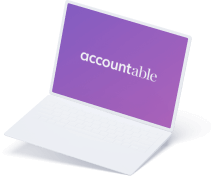
Did you find what you were looking for?

Happy to hear!
Thank you for your feedback. 💜
Stay in the know! Leave your email to get notified about updates and our latest tips for freelancers like you.
We’re sorry to hear that.
Can you specify why this article wasn’t helpful for you?
Thank you for your response. 💜
We value your feedback and will use it to optimise our content.
What other freelancers are reading

Income tax for freelancers – how much tax do I have to pay in Germany?
Working as a self-employed professional has many advantages: You are your own boss and you...

Want to start a side hustle in addition to your full time job? Here’s what you need to know.
When it comes to freelancing in Germany, it doesn’t have to be all or nothing....

Registering as self-employed in Germany: Freelancer or tradesperson (Freiberufler vs Gewerbetreibender)?
In Germany, becoming self-employed isn’t only about having a great idea for your new venture....

A word about the author
This article is presented to you by the Accountable Team, a diverse group of accountants and seasoned freelancers active in Belgium. Thanks to the real-life experience and expertise in topics such as self-employment, taxes, bookkeeping, VAT, and many more, the Accountable Team is able to share insights and practical advice to empower others on their freelance journey. We are dedicated to helping the self-employed thrive in today’s dynamic work environment and fostering a community of independent professionals.

Try Accountable for free
Taxes can be this easy!
- [email protected]
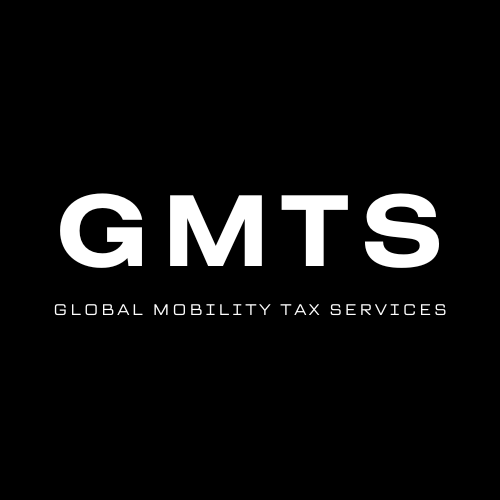
Home » Hot Topics » Germany per diem rates and how to manage employees travel expenses
Germany per diem rates and how to manage employees travel expenses
- 3 September 2022

One of the most frequently asked questions we get asked by our clients is how to manage employees travel expenses and Germany per diem rates. German regulations governing per diems, telecom expenses, hotel costs, meals reimbursements, mileage and so on, can often be confusing and different from an organization’s home-country rules.
Companies setting up shop in Germany are understandably concerned about how challenging it can be to stay compliant with German tax laws and want to avoid fines and reputational damage.
For this reason, we have decided to write this article with the aim of providing not only an overview on German travel expense reimbursements (as part of good expatriate management best practices ) but also to dissect and explain some of the finer details surrourding the complex circumstances companies face.
What are per diem rates?
According to Investopedia.com per diems (in German “ Tagespauschalen ”), from the Latin for “ by the day ”, refers to daily allowances paid to employees to cover costs incurred while on a business trip.
More specifically, the law in Germany talks about a lump sum for meals being paid to an individual as compensation for the expenses incurred in working outside their home and main workplace.
Moreover, an employment contract (or any other company issued policy) or collective bargaining agreement may also stipulate that per diems are to be used to reimburse employees.
Tax repercussions are likely (although as we will discuss in this article, not for all expenses categories) if employers choose to reimburse employees for actual expenses above the permitted per diem’s allowance instead.
On the other hand, there is less of an administrative burden for both companies and their employees when sticking with per diem rates as there is no need to:
– submit an itemized claim
– attach accompanying receipts
– update per diem rates each year in line the rising cost of living (the German Finance Ministry takes care of it)
What is not covered by Germany per diem rates
Now that we have a per diem definition and a law clarifying what per diem allowances are meant to cover in Germany, let us briefly look at what type of travel expenses, per diems are not meant to cover:
- Air fares
- Transport to and from the airport and/or meetings
- Hotel costs for staying overnight
- Breakfast, lunch and/or dinner whilst meeting clients
These types of expenses should be in fact be claimed as part of a separate expenses claim request (a template is provided towards the bottom of this article) for actual travel expenses incurred.
Per diem rates within Germany
When employees are traveling on business within Germany the costs of subsistence (drinks and meals) is typically reimbursed according to the applicable per diem rates which currently are:
– between 8-24 hours, 14 EUR
– for a full 24 hours day, 28 EUR
For the first and last day of travel, the applicable per diem rate is always 14 EUR.
Furthermore, there is also an overnight allowance of 20 EUR for accommodation.
In practice though, only self-employed individuals tend to claim this allowance via their German tax return as accommodation is usually fully paid by the employer for travelling employees.
Conditions for eligibility of per diem allowances
We have already discussed above what is not covered by per diem allowance.
Let us now look more specifically at what are some of the conditions to be fulfilled for employees to be eligible to claim the above mentioned per diem rates in full.
The main condition is that the full per diem meal allowances will only be paid if the employee actually covers the costs of their own food .
In the case of meals that the employee took and that are included for example in a hotel invoices (breakfast, lunch, dinner) or that the employer provided, there will be a compulsory reduction of the lump sum amount entitlement as follows:
– 20% reduction if breakfast is already included in hotel invoice
– 40% reduction if lunch / dinner are already provided by the employer.
It is also worth mentioning that meals provided by the employer for trips shorter than 8 hours are treated as fringe benefits and thus taxable on the employee are the following nominal values:
– breakfast, 1.77 EUR
– lunch or dinner, 3.30 EUR
Other conditions / rules attached to the eligibility for per diem rates in Germany include:
– hours can be added together for multiple trips within the same day
– The tax-free reimbursement can only be for 3 continuous months of business travel. These 3 months can then be reset after a 4 weeks break
– All expense invoices should be addressed to the company’s corporate address and if they exceed 150 EUR, they should state the VAT amount
Per diems outside of Germany
Considering that the cost of living between countries (and sometimes even between cities within the same country) can vary significantly, the German Ministry of Finance each year publishes a table with the up to date international per diem rates.
However, due to the Covid pandemic, the international per diem and overnight allowances issued by virtue of the German Federal Travel Expenses Act, have not been updated on January 1, 2022.
As a result, the tax-free per diem lump sums published by the BMF letter dated 3 December 2020 , on “Tax treatment of travel expenses and travel expense allowances for business and professional trips abroad from January 1, 2021” – Federal Tax Gazette Part I (BStBl I) page 1256, are also valid for the calendar year 2022.
Overview of other travel expense reimbursements in Germany
Entertainment.
Entertainment expenses for events in which only employees working for the same company took part are not accepted as an external party also needs to be involved.
Additionally, invoices for entertainment expenses reimbursements should clearly show the following information:
- Employee/s name/s
- Name/s of the people entertained
- The reason for the entertainment provided
- The place, date and signature
0.30 EUR/Km can be reimbursed tax-free. The lump sum rate covers all expenses related to the car such as insurance, depreciation, petrol / diesel, maintenance, car wash, etc.
Tax-free reimbursements for expenses incurred during business use for private cars can only be paid if the employees states on their expenses claims the driven KMs and other relevant details about the trip such as start / end KMs balance, details of the route taken and the reason for the trip.
Anything paid in addition to the 0.30 EUR/KM rate, will be deemed taxable.
This means that the amount will have to be split up in a tax-free part and a taxable part (taxed at individual income progressive tax rates).
Telecom expenses / home office
If the home telephone / mobile phone / internet contracts are between the telecommunication company and the employee and not between the telecommunication company and the employer, there are 4 possibilities to reimburse these expenses:
1) The employer can pay a monthly lump sum of 20% of the invoice amount up to a max. of 20 EUR tax free to the employee. Any additional reimbursements would be taxable.
2) If the employee highlights the costs incurred for the employer on the telecommunication company’s itemized bill every month, the employer can reimburse those costs tax-free.
3) If the employee highlights the costs incurred for the employer on the telecommunication company’s itemized bill for a period of 3 months, a typical percentage of total expenses concerning the employer can be calculated on the overall total bill, which can then be compensated tax free going forward every month. Any additional reimbursements above the calculated percentage apportionment would be taxable.
4) The employees could prove they have two different mobile phones / landline numbers so that they could clearly be differentiated between the one used for business purposes and the one used for private purposes. In such a scenario, all the expenses incurred for business purposes on the dedicated line / number can be reimbursed tax-free.
Hotel costs
Hotel stays during a business trip can be fully reimbursed tax free provided the invoice is addressed to the employer and not to the employee.
Other expenses
Other expenses such as flight, train or bus tickets can all be reimbursed in full tax-free.
Similarly, the following ancillary expenses can also be reimbursed tax-free for the full actual amount incurred:
– Storage of luggage (including luggage insurance)
– Letters to the employer or to business partners / clients
– Parking fees / tolls
– Rental car at the place of the destination
– Damages to the employee’s belongings if they are typical for business traveling
To help employees with their expenses claims, our travel expenses form may be downloaded here and used when submitting reimbursements requests (if the employer is not already providing one).
FAQ on Germany per diem rates and travel expenses reimbursements
Assuming the company chooses to reimburse the employee for the actual expenses amount incurred which happens to be above an allowable tax-free rate / per diem, does the employer have any compliance requirements in terms of reporting the difference .
(i.e. employer taxes and/or any requirements to report on the employee’s behalf with potential penalties if they don’t)?
Yes, the exceeding part is considered salary and as such subject to taxes and social security contributions.
As in the case of salary, the employer taxes the employee at source and has to fulfill his tax and social security obligations at all times.
The employee is the debtor of the income tax but the employer deducts it from him / her.
The employer is therefore responsible for withholding the applicable income taxes and social security contributions from the employee’s pay and thus liable, in case they do not.
Failure to do so could be deemed a criminal offence pursuant to Sec. 266a StGB (Criminal Law Act) .
Contact us should you require further clarifications on per diem rates and travel expenses reimbursements in Germany and/or have a look at some of the other insights we have published.
You might also be interested in:

Get our FREE International Expansion & Global Mobility guide now!
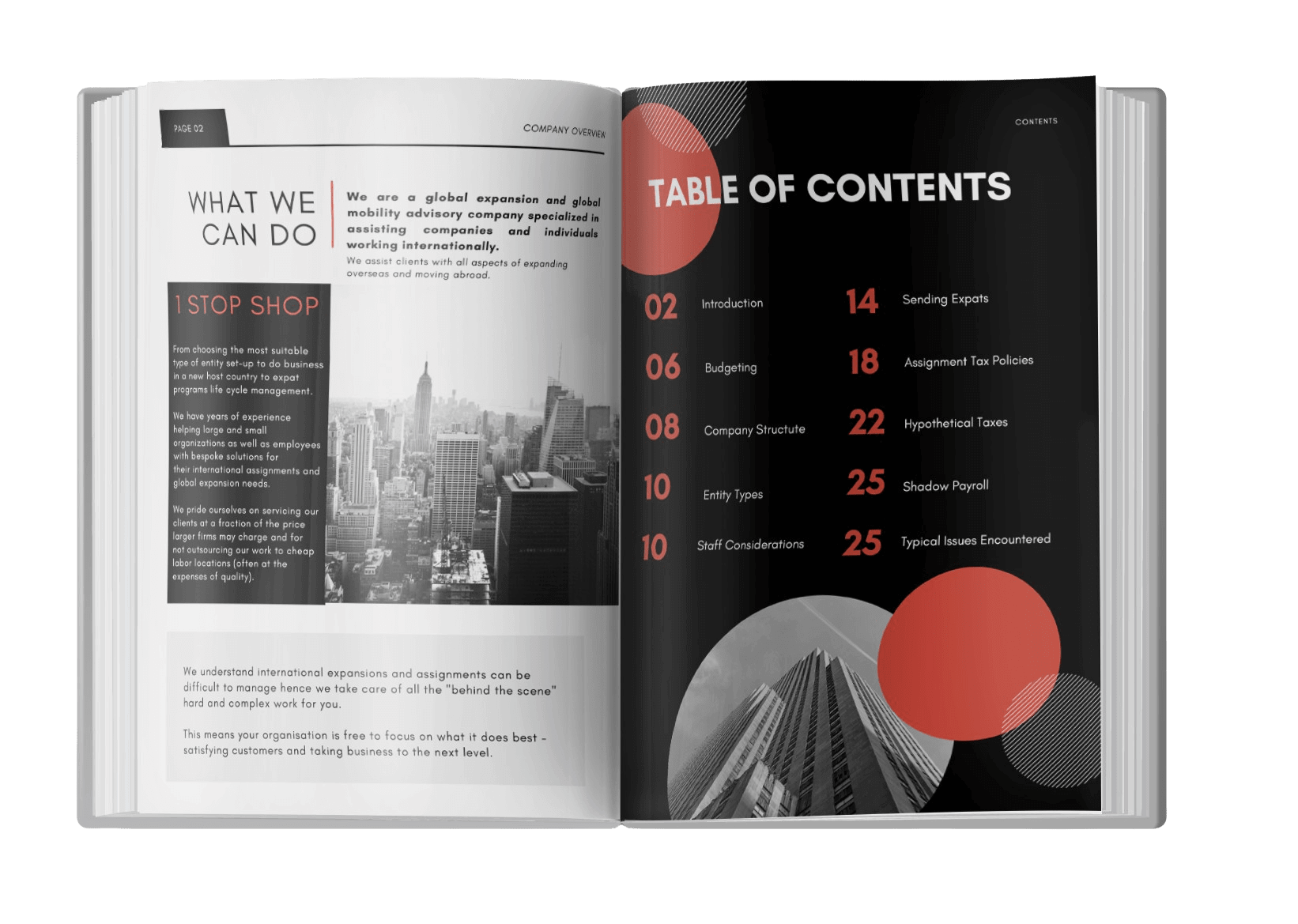
Telephone *
Company/Organisation *
Where are you located? * Choose a location Afghanistan Albania Algeria American Samoa Andorra Angola Anguilla Antarctica Antigua And Barbuda Argentina Armenia Aruba Australia Austria Azerbaijan Bahamas Bahrain Bangladesh Barbados Belarus Belgium Belize Benin Bermuda Bhutan Bolivia Bosnia And Herzegovina Botswana Bouvet Island Brazil British Indian Ocean Territory Brunei Darussalam Bulgaria Burkina Faso Burundi Cambodia Cameroon Canada Cape Verde Cayman Islands Central African Republic Chad Chile China Christmas Island Cocos (keeling) Islands Colombia Comoros Congo Congo The Democratic Republic Of The Cook Islands Costa Rica Cote D ivoire Croatia Cuba Cyprus Czech Republic Denmark Djibouti Dominica Dominican Republic East Timor Ecuador Egypt El Salvador Equatorial Guinea Eritrea Estonia Ethiopia Falkland Islands (malvinas) Faroe Islands Fiji Finland France French Guiana French Polynesia French Southern Territories Gabon Gambia Georgia Germany Ghana Gibraltar Greece Greenland Grenada Guadeloupe Guam Guatemala Guinea Guinea-bissau Guyana Haiti Heard Island And Mcdonald Islands Holy See (vatican City State) Honduras Hong Kong Hungary Iceland India Indonesia Iran Islamic Republic Of Iraq Ireland Israel Italy Jamaica Japan Jordan Kazakstan Kenya Kiribati Kosovo Kuwait Kyrgyzstan Lao People's Democratic Republic Latvia Lebanon Lesotho Liberia Libyan Arab Jamahiriya Liechtenstein Lithuania Luxembourg Macau Macedonia The Former Yugoslav Republic Of Madagascar Malawi Malaysia Maldives Mali Malta Marshall Islands Martinique Mauritania Mauritius Mayotte Mexico Micronesia Federated States Of Moldova Republic Of Monaco Mongolia Montserrat Montenegro Morocco Mozambique Myanmar Namibia Nauru Nepal Netherlands Netherlands Antilles New Caledonia New Zealand Nicaragua Niger Nigeria Niue Norfolk Island Northern Mariana Islands Norway Oman Pakistan Palau Palestinian Territory Occupied Panama Papua New Guinea Paraguay Peru Philippines Pitcairn Poland Portugal Puerto Rico Qatar Reunion Romania Russian Federation Rwanda Saint Helena Saint Kitts And Nevis Saint Lucia Saint Pierre And Miquelon Saint Vincent And The Grenadines Samoa San Marino Sao Tome And Principe Saudi Arabia Senegal Serbia Seychelles Sierra Leone Singapore Slovakia Slovenia Solomon Islands Somalia South Africa South Georgia And The South Sandwich Islands Spain Sri Lanka Sudan Suriname Svalbard And Jan Mayen Swaziland Sweden Switzerland Syrian Arab Republic Taiwan Province Of China Tajikistan Tanzania United Republic Of Thailand Togo Tokelau Tonga Trinidad And Tobago Tunisia Turkey Turkmenistan Turks And Caicos Islands Tuvalu Uganda Ukraine United Arab Emirates United Kingdom United States United States Minor Outlying Islands Uruguay Uzbekistan Vanuatu Venezuela Viet Nam Virgin Islands British Virgin Islands U.s. Wallis And Futuna Western Sahara Yemen Zambia Zimbabwe
Brief description of your enquiry * I accept * By entering your information, you permit us to reach out to you with future communications and you accept our Terms and Conditions & Privacy Policy
Terms & Conditions – Privacy policy – Cookie policy
Privacy Overview
Travel expenses in Germany
The Bezala travel expense app allows you to apply for local per diems and mileage allowances defined by the German Tax Office.
Bezala supports VAT rates, expenses claims, mileage allowances, and per diems in Germany.
The mileage allowances in Germany for the year 2024
When driving by own car or other motor vehicles (KFZ), the rate for tax-exempt Mileage allowance is 0.30 € / km. For motorcycles, scooters, and mopeds, the allowance is 0.20 € / km . Bezala makes claiming German mileage allowances easy.
Per diems in Germany for the year 2024
- Travel for less than 8 hours: No per diem
- Travel for 8-24 hours: Partial per diem (16 €)
- Travel for more than 24 hours, and it continues past midnight: Full per diem (32 €)
- Day of return: Partial per diem (16 €)
The accommodation allowance is 20 € per night if the employer does not provide the accommodation for the employee.
You can claim local and foreign Per Diems defined German Tax Administration with
Deductions from Per Diems
If the employer offers free meals to the employee during the travel, the meals should be deducted from the Per Diem paid to the employee.
Deductions:
- Breakfast: -20%
- Lunch: -40%
- Dinner: -40%
However, free meals are not to be deducted from the partial per diem.
Bezala – Europe's most automated expense software
Your team can easily file Receipts, Mileages and Per Diems and you can Approve them with one click. We'll remind your employees of missing credit card receipts and automatically take care of your accounting.
Integrations
Bezala has an integration to USA based ERP system NetSuite . In additional, you can create and modify csv files and we will send them directly to an SFTP server or e-mail. Check out our integrations . Sources: Akademie Herkert: Per diems and Mileages in Germany 2024
Foreign per diems 2024
Recent news
Bezala news 3/2024, bezala news 2/2024, how much do the mileage allowances and per diems increase for different countries in 2024.
- Facebook Twitter Instagram
- Tax Refunds
- Tax Returns
If you worked in any of these countries, you could be due a Tax Refund
- New Zealand
Residents / Expats and other Tax Services
- Australian Citizen Tax Returns
- Tax Services for Canadians & Residents
- Irish Tax Return Filing
- Self Employed and UK Tax Return Services
- US Income Tax Returns
- Tax Numbers for Business & Individuals
- U1 / E104 Forms
- Expatriate Tax Services
How to claim work related expenses in Germany
Many people are unaware that it’s possible to claim a tax deduction for certain work related expenses in Germany.
The German tax office will automatically deduct a lump sum of €1,000 for work related expenses when you’re filing your tax return. No proof is required for this lump sum.
However, if your expenses are higher than the lump sum you should claim the costs incurred instead of the lump sum, the tax office will ask for proof for these expenses.
Below we have outlined some work related expenses in Germany that you may be eligible to claim a tax deduction on.
Travelling to work
You can claim €0.30 back for every kilometer you travel from your home to your workplace. Regardless of whether you travel by car (including sharing a car) or train, you can claim the lump sum. You can claim a flat rate of up to €4,500 per year for the commuters tax allowance.
However, if your travel costs are higher than the lump sum it would be best not to use the flat rate. Alternatively, you should claim your actual travel costs and keep all your receipts and tickets related to travel.
Work equipment
When you purchase a piece of equipment for work you may be able to claim it as an expense. If the item does not exceed €952 it can be claimed immediately. Any cost that your employer hasn’t reimbursed you for can also be deducted. Examples of work equipment include:
- Work clothes - like a doctor's coat or boiler suit
- PC, notebook, smartphone
- Workplace equipment (desk, office chair, book shelf)
The Average German Tax Refund is €1020
GET YOURS NOW
Any insurance that covers you for occupational risk can be claimed as a work related expense. This includes professional liability, accident insurance, and legal expenses insurance.
Insurance plans that cover a private risk (health insurance, private nursing insurance, life insurance, personal liability insurance, legal costs insurance etc) are not included in work related expenses, but they can be deducted as additional expenses.
The expense of moving to another location for your job is also tax deductible. Expenses that can be deducted include:
- Travel costs e.g. hotel costs, flight costs, train costs etc.
- Transport costs
- Double paid rent
- Storage of furniture
There is a lump sum of €764 that can be deducted in addition to the actual moving expenses.
Business trips and training
Travel expenses for business trips and expenses for training can be deducted in your tax return.
The lump sum for business trips can be for return trips, with an allowance of €0.30 per kilometer. If your employer reimburses you with the travel costs then you will have to declare it on your tax return.

Double household
If you have a second household for work purposes, you can avail of many tax deductions. The second home must be nearer to the workplace than the first home, your primary residence (first home) must be where your family/ friends live and you must also contribute financially to the primary residence.
The following are tax deductible expenses for your second household:
- Furniture and furnishings
- Travel between your first and second home
Who can help me claim my work related expenses?
To see how much of a refund you may be due back check out our German tax refund calculator .
The average German income tax refund a Taxback customer receives is €1,020 so don't put off applying any longer!
Why choose Taxback?
Our team will take care of all the paperwork for you so you don’t have to!
- Maximum tax refund guaranteed
- Simple online process - no complicated form
Apply for your German tax refund today!
Popular Articles
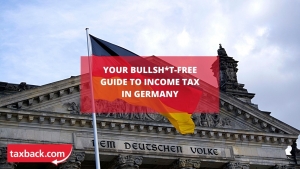
Your Bullsh*t-Free Guide to Taxes in Germany

Ghidul vostru pentru fiscalitate și pentru rnarea impozitelor din Germaniaetur

Szczery do bólu przewodnik po podatkach w Niemczech

How to calculate Germany’s per diem rates in 2023 / 2024

Published on November 28, 2023
)
Germany is known worldwide for its cultural commitment to efficiency and attention to detail. For the most part, these ideas have served the nation well - it boasts the fourth-largest economy in the world; first in Europe.
But in some cases, efficiency and precision butt heads against one another. And business trips are one of those cases.
Employees in German companies have fixed per diem rates to cover travel expenses . These are set by the government, which in theory makes things more efficient. Companies don’t need to create their own policies - they just follow the rules.
But there’s a problem: the rules are fairly complex, and lots of businesses struggle to follow them.
Efficiency, meet precision.
In this article, we’re going to give you a clear overview of the law for business travel within Germany and abroad.
Please note: This article contains per diem rates and rules for 2024 (in place since 2021). You can find applicable flat rates for the most common destinations further down in this article.

What are per diem rates?
This will probably be clear to most readers, but it’s important that we set out just what we’re talking about. While travelling for work, certain costs are incurred by the employee and should be reimbursed by the company .
Some costs are expected to be covered your per diem, and therefore don’t need to be claimed separately. You’ll simply want to keep these costs below the daily per diem rate you’ve been allocated.
Other costs aren’t covered by your per diem, which means you should include them in an expense claim .
Covered by per diem
These will fall under the fixed rates below, and should not be claimed separately .
Meals purchased while travelling for work
The law (see below) only talks about meals. Some employees will choose to include other small costs (metro tickets or stationery for example), rather than seeking reimbursement for these minor items.
Not covered by per diem
These expenses should still be reimbursed by the company as part of a separate expense claim .
Transport to and from the airport or meetings
Accommodation if staying overnight
Meals and other costs incurred while meeting clients
Keep this distinction in mind when travelling. Now, let’s look at the specific rules for per diems.
The law around German per diem rates
The applicable law in this case is the statute on income tax - more precisely section 9, paragraph 4(a) (link in German). This covers meals for travelling workers, and essentially states the following:
If the employee works outside their home and first place of work (external occupational activity), a lump sum for meals is paid in compensation for the additional expenses.
[The actual rates paid are in the next section of this post.]
Since it would be time-consuming, complicated, and potentially unfair to have individual businesses set their own rates, the government does it for them. So as long as the rates are easy to understand and make sense, this is a good thing.
It also prevents the need for itemized expense claims - something employees generally hate . You don’t need to submit every receipt and take hours filling in expense reports. If you travel for X number of days, you receive Y in reimbursement.
The rates depend on travel duration and destination (see table below).
Note : You can’t claim these rates twice.
Two fee rates for all business trips
At the end of each year, the Federal Ministry of Finance publishes the applicable meal allowances for the following year. For the first time in many years, the flat rate allowances for business travel were updated in 2020.
Although the lump sums have changed for some countries, the basic principle remains the same. Since January 1, 2014, only two meal per diems apply, both within Germany and abroad. These are based on the travel duration:
Small meal allowance : for business trips lasting more than eight hours and less than 24 hours. This rate also applies to arrival and departure days of multi-day business trips.
Large meal allowance : For business trips that last longer than 24 hours. This rate is applied to every single day.
Important note : The expense calculation is based on full calendar days . In fact, to claim a full day, the traveller actually has to be away from home (or the office) from 0:00 to 24:00.
Anyone who went on a business trip before 2014 will find that a few things have changed with the reform of travel expenses. The most important change: business trips with a duration of less than eight hours can no longer be billed .
Current per diem rates in Germany
The rates for business travel in Germany changed slightly in 2020, for the first time in years.
Even with the 2014 reform, only the categories were changed, but not the amount of the lump sums. So this 2020 update is worth noting.
Today, these are the lump sum amounts for German per diems :
For business trips with a duration of less than 24 but more than eight hours, €14 can be noted in the travel expense report.
With a minimum duration of 24 hours, €28 euros can be claimed for each full day, and €14 euros for arrival and departure days (which will obviously be less than 24 hours).
The overnight flat rate is €20 - to be used for accommodation. In reality, accommodation will usually be covered fully by the employer , so travelling employees won’t claim this cost. But in cases where accommodation is not covered - for freelancers, for instance - this cost can usually be claimed through an individual’s income taxes.
Why is the overnight lump sum so low? One theory is that this should prevent fraudulent charges if business travellers choose to stay with friends or relatives.
You can find an example calculation in our free travel expense report template .
Exceptions to these rules
No good rules or regulations would be complete without exceptions. Thankfully, in this case they’re simple and quite brief.
First, the food allowance will only be paid in full if the business traveller actually pays for their own food . If the employer pays for meals on the trip, the rate will be reduced accordingly:
If breakfast is included (in the hotel fee, for example), 20 percent of the flat rate will be deducted for the day.
If lunch or dinner is provided by the employer, 40 percent of the fee will be removed.
For shorter business trips, it should be noted that meals provided by the employer are subject to income tax. Here are the so-called non-monetary benefits which must be taken into account in at tax time :
For breakfast, the value is currently €2.00.
For a lunch or dinner, €3.80 will be charged.
Foreign packages for business travel
As already mentioned, the categories for food allowances for business trips in Germany and abroad apply equally. But the rates of reimbursement may differ significantly depending on the country .
While an overnight stay in London, for example, costs €163, in Rome the value is only €150. For a day in Tokyo, the package is €50, but in Athens it's only €40.
The list also includes prices in different regions in the same country. For example, a stay in Miami is more expensive than in Los Angeles.
Unlike the lump sums for business travel within Germany, the rates for foreign destinations are frequently adjusted .
To help, we put together a list with the most frequented destinations and their respective meal allowances in this article. (at the bottom).
You can find the complete list here .
German per diems: clear as mud
Hopefully this article has helped to clear up some of the confusion around the German per diem system. In some ways it all seems unnecessarily complex, but once you have the basic concepts it should be fairly simple to repeat regularly.
The key parts to remember are the specific rates you can claim for each day, and that you can’t claim costs that have already been covered by your employer .
To help you manage your next business trip and keep on top of all spending (per diem or not), download our free Expense Report Template below.
More travel articles
VAT and expenses for UK businesses
10 excellent business travel management tools for 2023
The complete guide to corporate travel management
More reads on Product Updates
)
Universal Social Charge (USC): a guide for employers
)
HR integrations: How to connect spend management & payroll tools
)
8 keys to create an effective annual plan for 2024
Get started with spendesk.
Close the books 4x faster , collect over 95% of receipts on time , and get 100% visibility over company spending.

Create travel expense report
On your business trips you incur expenses for food, accommodation & Co. If you prepare a travel expense report , you can claim your travel expenses and have them reimbursed by your employer or save taxes vis-à-vis the tax office. We explain what travel expenses include and how the travel expense software Spesenfuchs supports you.
The regulations described below are valid as of January 2021. Regulations change over time, usually annually. Therefore, it makes sense to use software for travel expense accounting that always takes into account the current regulations . With an Excel spreadsheet for the settlement of travel expenses, you may be dealing with a lot of extra work if it becomes outdated after a year.
How to create a travel expense report?
The travel expense software Spesenfuchs helps you to create a proper travel expense report . In this way, you can avoid mistakes that may lead to trouble with the tax office and result in high additional payments. It is important that you first correctly indicate the following items on each travel claim:
- Name of the traveler
- Name of the trip (reason for the trip)
- Destination
A travel expense report usually further consists of the components explained in more detail below:
- Additional expenses for meals
- Accommodation costs (hotel or flat rate)
- Incidental travel expenses (e.g. for flight, cab, etc.)
Travel expenses
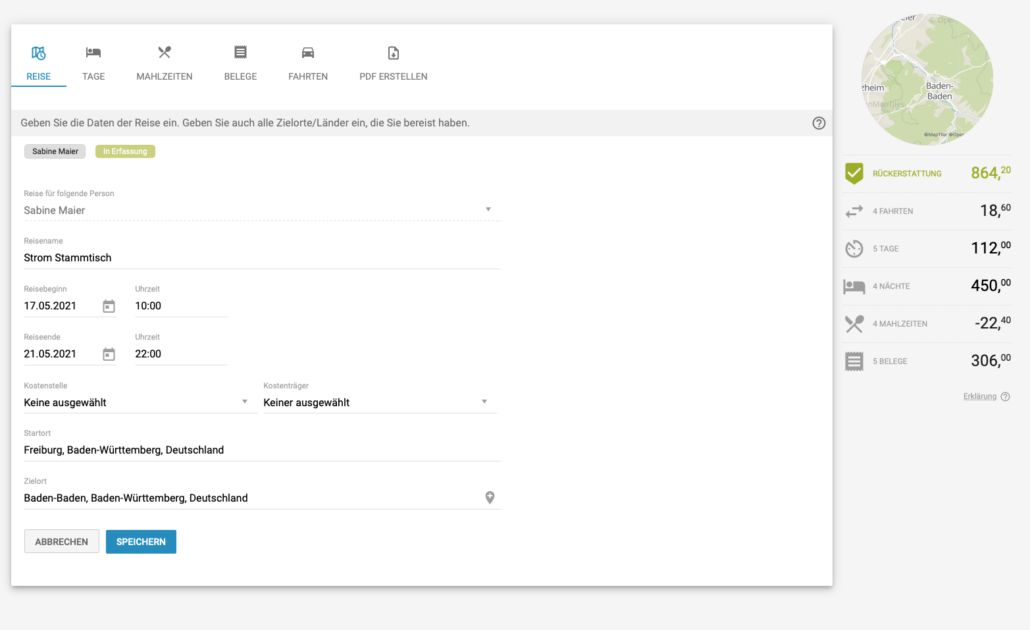
Catering expenses
If you travel on business, you incur meal costs as a result; these are called additional meal expenses . The concept of additional meal expenses comes from the fact that when you are on the road, you have “more expense” for your meals – meals on the road are more expensive than at home. In common parlance, the additional meal expenses are also called per diem , analogous to the following per diem for overnight stays .
In principle, all additional meal expenses are reimbursed to you tax-free . Legislation allows you to receive a certain amount tax-free for each day you travel on business to compensate for the expense of meals on the road. Whether or not you receive this amount from your employer (tax-free) is irrelevant for tax purposes.
However, according to the statutory travel expense guidelines , the amount of money you receive back or can claim for tax purposes is graded according to the duration of your absence per calendar day. Since the 2014 travel expense reform, there are two flat rates that you can easily enter in your travel expense report for your professional absences within Germany:
The current additional meal expenses for 2021 for Germany are as follows. If a trip includes one day and is shorter than 8h, then no per diem is granted.
Overnight stay flat rate
You have two options with regard to claiming overnight expenses on your trips:
- You use a flat rate in your travel expense report. This amounts to 20 euros per night for Germany (in 2021). You do not need an itemized bill. The travel expense software Spesenfuchs uses the per diems automatically as long as you do not enter a hotel receipt. However, self-employed persons are not allowed to report an overnight allowance .
- You have a hotel voucher . You will receive a reimbursement in the proven amount. Important: Note that accommodation costs often already include the cost of breakfast . However, breakfast is part of the meals and therefore already included in the flat rates for additional meal expenses. If this happens to you, you will have to deduct an amount for breakfast in your travel expense report. This amount is also called a reduction . The reduction is calculated from the amount of the additional meal expense. It is necessary to deduct 20% of the amount for the absence of 24 hours for the particular country of travel. For Germany, this is currently 5.60 euros per breakfast in 2021.
What regulations apply to travel abroad?
As soon as you travel abroad on business, different amounts apply for travel expense reporting than within Germany. The current rates are published regularly as part of a BMF letter . However, depending on the country of travel (and sometimes also within countries depending on the city), these can vary. The travel expense software Spesenfuchs knows all current per diems and automatically uses the right ones for your destination.
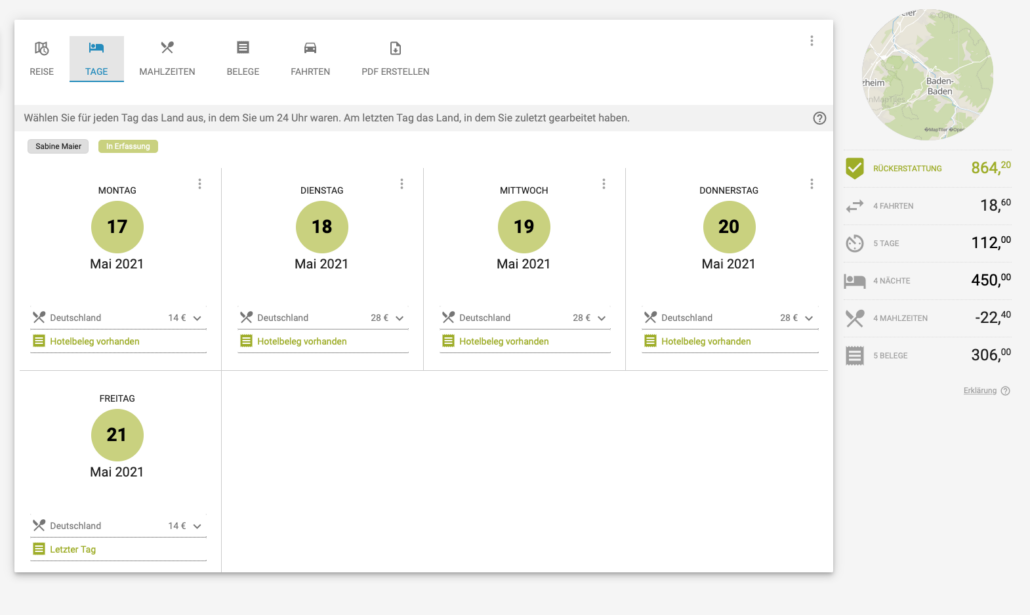
Just as for breakfast, if the employer arranges for the employee (or you as a self-employed person arrange for yourself) to have a meal in a professional context, a certain amount must be deducted from the additional meal expenses. This makes sense, since in this case there is no additional expense for catering – the meal was provided. For lunch or dinner, 40% of the daily allowance is deducted for each 24h absence. Thus, in the case of full board, 20% + 40% + 40% are deducted, so that no more per diem for meals is granted – you are also fully boarded.
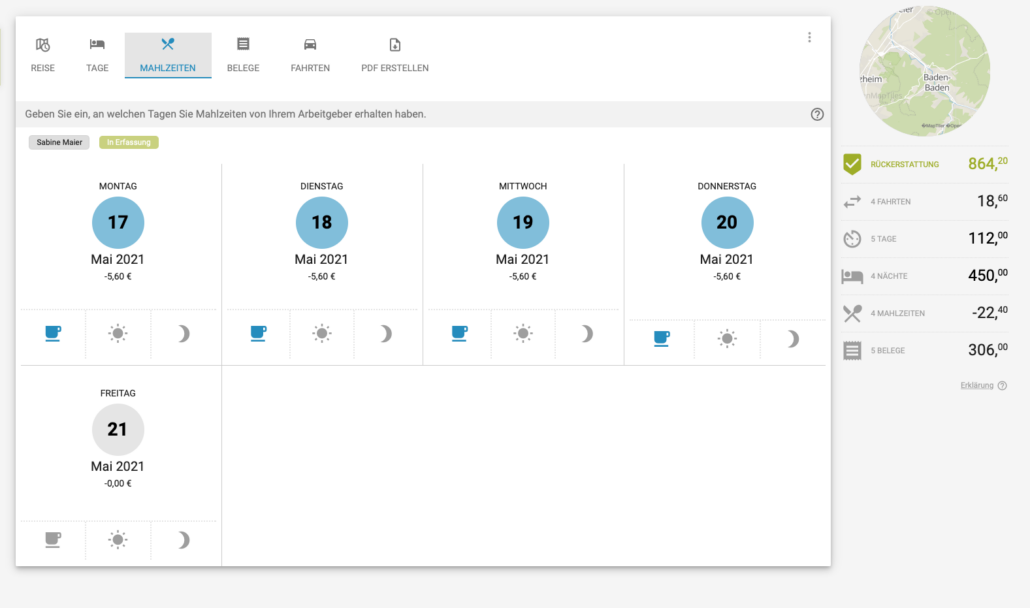
Special features of travel expense reporting
As you can see, there are a few points to consider when creating a proper travel expense report. But that was not all:
- Not all countries are included in the above list from the BMF. For a number of countries not included in the list, the Luxembourg per diems and per diems must be used. For other countries or regions, different contexts apply due to the countries’ geography or history.
- Non-cash benefit: since the 2014 travel expense reform, there is an important distinction here, which we discuss here .
- Further, there are VAT regulations related to the Corona Pandemic, which will be discussed in this article.
The travel expense software Spesenfuchs takes all these points into account, so that you can be sure to create a legally/tax-compliant travel expense report.
Incidental travel expenses include all other expenses that are additionally incurred in connection with your business trips. In the travel expense software Spesenfuchs you enter all incurred expenses on the Receipts page. The correct tax rates are automatically suggested and, in the case of foreign receipts, a correct conversion is automatically made into euros on the date of the receipt. For example, expenses that you can include in your travel expense report include the following items:
- Entertainment costs
- Training costs
- Parking fees
- Ferry costs
- Baggage fees
- Professional phone calls
With few exceptions, you may claim incidental travel expenses in full on your travel expense report. A prerequisite for reimbursement is, of course, that you can provide the appropriate supporting documents. In Spesenfuchs you will never lose a receipt again. Upload the receipt so that you have it available digitally. In this way, the document also goes to your accounting department or to your tax advisor.
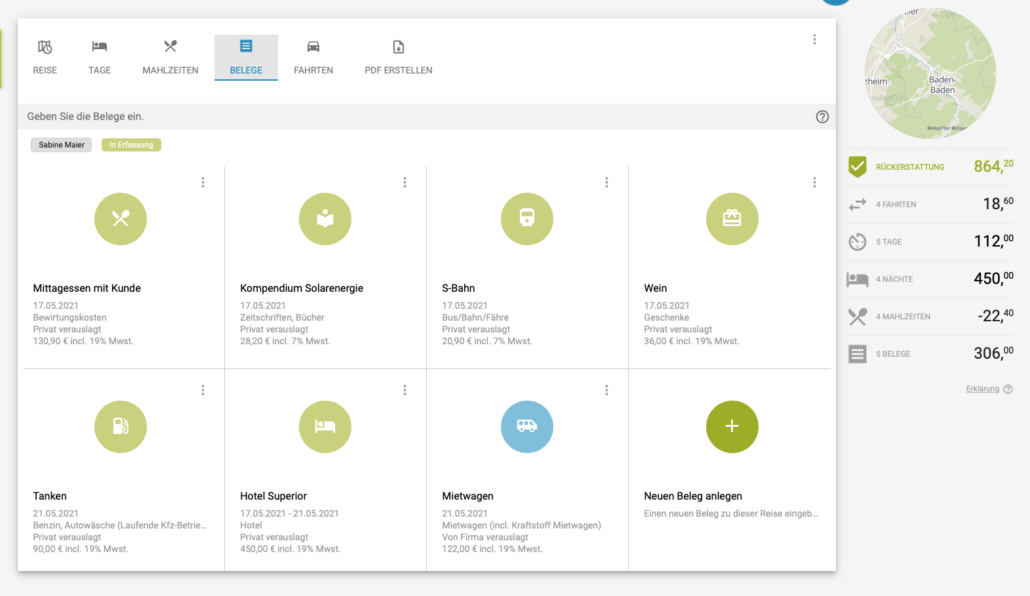
For travel expenses, it depends on how they were incurred:
Company car
Private vehicle, bus, train or plane.
If you use a company car for your business trips, you only have to keep a proper driver’s logbook or alternatively apply the 1% method for taxation. Otherwise, you do not need to pay attention to anything else here.
Things get a bit more complicated as soon as you use a private vehicle for business purposes. Here you have two options for taxation:
Flat mileage rate
For business trips with your private vehicle, you set 0.30 euros per kilometer driven in the travel expense report. This km rate is used automatically by Spesenfuchs.
For business trips by motorcycle or other two-wheeled vehicles, a flat rate of 0.20 euros per kilometer traveled applies.
These rates are tax exempt.
Individual kilometer rate
With the individual mileage rate, all costs related to the vehicle can be taken into account. All costs, such as depreciation, gasoline, insurance, are added up and then divided between the kilometers driven privately and those driven on business. A driver’s logbook should be kept as proof of the kilometers driven for private or business purposes.
If you want to apply an individual mileage rate, then you can store an individual rate for each employee in Spesenfuchs.
Any amounts in excess of the flat mileage rate must be taxed at the employee’s individual tax rate.
In the reports and In export, the amounts for tax-free and taxable mileage allowances are output correctly.
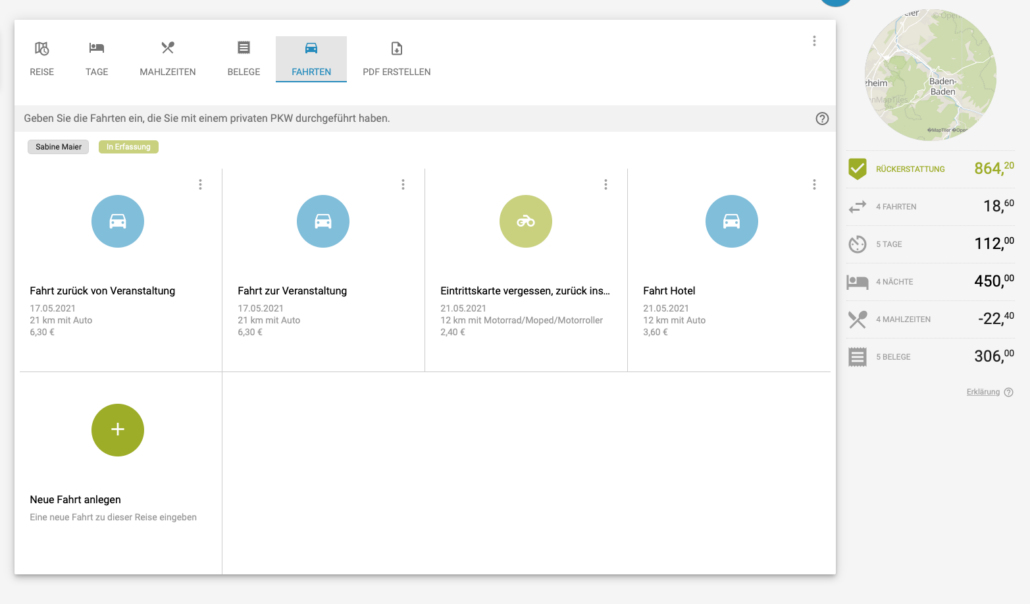
If you travel on business by bus, train or plane, you can deduct the travel expenses incurred in full from your taxes. All you need here for your travel expense report is a corresponding receipt.
SPESENFUCHS
Legal notice
Privacy settings
Digitise receipts
All functions
Integrations

Small Business Trends
10 tax deductions for travel expenses (2023 tax year).

Tax season can be stressful, especially if you’re unaware of the tax deductions available to you. If you’ve traveled for work throughout the year, there are a number of deductions for travel expenses that can help reduce your taxable income in 2024 and save you money.
Read on for 10 tax deductions for travel expenses in the 2023 tax year.
Are business travel expenses tax deductible?
Business travel expenses incurred while away from your home and principal place of business are tax deductible. These expenses may include transportation costs, baggage fees, car rentals, taxis, shuttles, lodging, tips, and fees.
It is important to keep receipts and records of the actual expenses for tax purposes and deduct the actual cost.
What kinds of travel expenses are tax deductible?
To deduct business travel expenses, they must meet certain criteria set by the IRS.
The following are the primary requirements that a travel expense must meet in order to be eligible for a tax deduction:
- Ordinary and necessary expenses: The expense must be common and accepted in the trade or business and be helpful and appropriate for the business.
- Directly related to trade or business: The expense must be directly related to the trade or business and not of a personal nature.
- Away from home overnight: The expense must have been incurred while away from both the taxpayer’s home and the location of their main place of business (tax home) overnight.
- Proper documentation: The taxpayer must keep proper documentation, such as receipts and records, of the expenses incurred.
Eligible Business Travel Tax Deductions
Business travel expenses can quickly add up. Fortunately, many of these expenses are tax deductible for businesses and business owners.
Here is an overview of the types of business travel expenses that are eligible for tax deductions in the United States:
Accommodation Expenses
Accommodation expenses can be claimed as tax deductions on business trips. This includes lodging at hotels, rental costs of vacation homes, and other lodgings while traveling.
Meal Expenses
Food and beverage expenses incurred on a business trip may be deducted from taxes. This includes meals while traveling and meals during meetings with clients or contractors.
Transportation Expenses
Deducting business travel expenses incurred while on a business trip may also be claimed.
This includes flights, train tickets, car rentals, gas for personal vehicles used for the business trip, toll fees, parking fees, taxi rides to and from the airport or train station, and more.
Expenses of operating and maintaining a car
Expenses of operating and maintaining a car used for business travel may also be claimed as tax deductions.
This includes fuel, insurance, registration costs, actual costs of repairs, and maintenance fees. Fees paid to hire a chauffeur or driver may also be deducted.
Operating and maintaining house-trailers
Operating and maintaining house trailers for business travel may be eligible for tax deductions, provided that the use of such trailers is considered “ordinary” and “necessary” for your business.
This includes any costs associated with renting or owning a trailer, such as fuel costs, repair and maintenance fees, insurance, and registration charges.
Internet and phone expenses
Internet and phone expenses associated with business travel can also be claimed as tax deductions. This includes the cost of any internet service, such as Wi-Fi or data plans, and phone services, such as roaming charges or international calls.
Any communication devices purchased for business use, such as smartphones and laptops, may also be eligible for tax deductions.
Computer rental fees
Rental fees for computers and other computing devices used during business travel may also be deducted from taxes. This includes any applicable charges for purchasing, leasing, or renting a computer, as well as the related costs of connecting to the Internet and other digital services.
All such expenses must be necessary for the success of the business trip in order to qualify for a tax deduction.
Travel supplies
Travel supplies, such as suitcases and other bags, are also eligible for tax deductions when used for business travel. Any costs associated with keeping the items protected, such as locks and tracking devices, can also be claimed as tax deductions.
Other necessary supplies, such as office equipment or reference materials, may also be eligible for deductions.
Conference fees and events
Conference fees and events related to business travel may also be eligible for tax deductions. This includes fees associated with attending a conference, such as registration, accommodation, and meals.
Any costs related to the organization of business events, such as venue hire and catering, may also be claimed as tax deductions.
Cleaning and laundry expenses
Business travel expenses associated with cleaning and laundry may also be claimed as tax deductions. This includes a portion of the cost of hotel and motel services, such as cleaning fees charged for laundering clothing, as well as any other reasonable expenses related to keeping clean clothes while traveling away from home.
Ineligible Travel Expenses Deductions
When it comes to business expenses and taxes, not all travel expenses are created equal. Some expenses are considered “Ineligible Travel Expenses Deductions” and cannot be claimed as deductions on your income taxes.
Here is a list of common travel expenses that cannot be deducted, with a brief explanation of each:
- Personal Vacations: Expenses incurred during a personal vacation are not deductible, even if you conduct some business while on the trip. In addition, expenses related to personal pleasure or recreation activities are also not eligible for deductions.
- Gifts: Gifts purchased for business reasons during travel are not deductible, even if the gifts are intended to benefit the business in some way.
- Commuting: The cost of commuting between your home and regular place of business is not considered a deductible expense.
- Meals: Meals consumed while traveling on business can only be partially deducted, with certain limits on the amount.
- Lodging: The cost of lodging is a deductible expense, but only if it is deemed reasonable and necessary for the business trip.
- Entertainment: Entertainment expenses, such as tickets to a show or sporting event, are not deductible, even if they are associated with a business trip.
How to Deduct Travel Expenses
To deduct travel expenses from income taxes, the expenses must be considered ordinary and necessary for the operation of the business. This means the expenses must be common and accepted business activities in your industry, and they must be helpful, appropriate, and for business purposes.
In order to claim travel expenses as a deduction, they must be itemized on Form 2106 for employees or Schedule C for self-employed individuals.
How much can you deduct for travel expenses?
While on a business trip, the full cost of transportation to your destination, whether it’s by plane, train, or bus, is eligible for deduction.
Similarly, if you rent a car for transportation to and around your destination, the cost of the rental is also deductible. For food expenses incurred during a business trip, only 50% of the cost is eligible for a write-off.
How do you prove your tax deductions for travel expenses?
To prove your tax deductions for travel expenses, you should maintain accurate records such as receipts, invoices, and any other supporting documentation that shows the amount and purpose of the expenses.
Some of the documentation you may need to provide include receipts for transportation, lodging, and meals, a detailed itinerary or schedule of the trip, an explanation of the bona fide business purpose of the trip, or proof of payment for all expenses.
What are the penalties for deducting a disallowed business expense?
Deducting a disallowed business expense can result in accuracy-related penalties of 20% of the underpayment, interest charges, re-assessment of the tax return, and in severe cases, fines and imprisonment for tax fraud. To avoid these penalties, it’s important to understand expense deduction rules and keep accurate records.
Can you deduct travel expenses when you bring family or friends on a business trip?
It is not usually possible to deduct the expenses of taking family or friends on a business trip. However, if these individuals provided value to the company, it may be possible. It’s advisable to speak with an accountant or financial expert before claiming any deductions related to bringing family and friends on a business trip.
Can you deduct business-related expenses incurred while on vacation?
Expenses incurred while on a personal vacation are not deductible, even if some business is conducted during the trip. To be eligible for a deduction, the primary purpose of the trip must be for business and the expenses must be directly related to conducting that business.
Can you claim a travel expenses tax deduction for employees?
Employers can deduct employee travel expenses if they are ordinary, necessary, and adequately documented. The expenses must also be reported as taxable income on the employee’s W-2.
What are the limits on deducting the cost of meals during business travel?
The IRS permits a 50% deduction of meal and hotel expenses for business travelers that are reasonable and not lavish. If no meal expenses are incurred, $5.00 daily can be deducted for incidental expenses. The federal meals and incidental expense per diem rate is what determines the standard meal allowance.
YOU MIGHT ALSO LIKE:
- nondeductible expenses
- standard deduction amounts
- Hipmunk small business
Image: Envato Elements

Your email address will not be published. Required fields are marked *
© Copyright 2003 - 2024, Small Business Trends LLC. All rights reserved. "Small Business Trends" is a registered trademark.
Tax Reporting
Procedures for payments made to or on behalf of international students, visitors and vendors, general information.
All payments made to or on behalf of an international visitor, student or supplier have potential tax considerations requiring special attention. Additional processing time is required for transactions involving foreign visitors, vendors and students.
It is recommended to contact Tax Reporting at [email protected] prior to processing payments to international taxpayers.
Types of Payments Requiring Special Attention
Examples of payments to foreign visitors, students and suppliers requiring special handling include but are not limited to:
- Stipends and fellowships
- Payments for services
- Travel payments for international visitors
- Travel payments for international students
- Payments for software
- Royalty payments
- Payments to U.S. agents representing international performers
- Payments to foreign agents or performers
- P-Card payments to international companies
All payments made to or on behalf of international students and visitors must comply with regulations established by the U.S. Citizenship and Immigration Services (USCIS).
Note: The University may be unable to make a payment (including expense reimbursements) to an international visitor if their visa does not allow such payments.
The information contained in this document applies to individuals classified by the USCIS as other than U.S. citizens or permanent residents (green card holders).
It is critical to determine if the visa classification and other circumstances related to the international visitor allow for payment of any kind. Do not pre-pay travel expenses for international visitors using a P-card or direct payment without prior approval from Tax Reporting. Most travel payments for international visitors must be processed as expense reimbursements because verification of valid visa status and legal entry in the U.S. cannot be confirmed until after the visitor enters the country.
Note: Individuals cannot pay international visitors with personal funds and then request reimbursement from the University.
Documentation Required
Travel reimbursements and honorarium payments – international visitors.
Visitors must be eligible to receive travel reimbursements based on visa status. Visitors should enter the U.S. in a business status, not tourist status. Please instruct your visitor of the business visit requirement. Departments should provide the visitor with a letter of invitation that includes a business purpose for the trip. Travel reimbursements must conform to the Boise State travel policy to be exempt from tax reporting and withholding.
The following visitor documentation must be obtained prior to the international visitor’s departure from Boise State:
- Copy of Passport (with picture)
- Copy of Passport stamp showing admittance and departure date for Boise State visit
- Copy of Visa – where applicable
- An I-94 is required for all visitors
- I-94 Official Website
- Individuals who are present in the U.S. in a status other than Visa Waiver or B1/B2 may be required to present additional documents.
- Completion of PaymentWorks record
Important information for Honorarium Payments
Visitor must be eligible to receive honorarium payments based on visa status and American Competitiveness and Workforce Improvement Act (ACWIA) of 1998 requirements. The ACWIA requirements are:
- Visitor must be present under a B-1 visa or WB waiver for business
- Payment must be for “usual academic activity” defined as lecturing, teaching, sharing knowledge, attending meetings of boards or committees
- Activity must last no longer than 9 days at a single institution
- Individual may not accept honoraria from more than five institutions within a six- month period
Please confirm with your visitor that they are able to meet the ACWIA requirements prior to committing to an honorarium payment.
All payments of honorarium require tax reporting and potentially tax withholding. Boise State uses a third-party database called Sprintax Calculus for tax reporting purposes. Individuals who receive honorarium payments will be required to complete a Sprintax Calculus tax record and sign all applicable tax forms.
Sprintax Calculus
The following individuals require a Sprintax Calculus record.
- All international visitors who receive honorarium payments, fee for service or taxable travel payments
- International students who receive taxable travel, scholarship, or fellowship payments
- All international employees
Sprintax Calculus is an online tax compliance software used to make tax residency and income tax treaty determinations. Payments will not be made before the Sprintax Calculus record for the individual is completed.
How to set up a Sprintax Calculus Record
- Email [email protected]
- Include visitor name and email address
- If payment is made to a Boise State student, provide name and student ID number
- The student/visitor will receive an email request from [email protected] with log in information and instructions to complete the record
- The visitor completes the record, and e-signs the tax forms
- The individual also needs to let the Tax Reporting know once complete, so the forms and the record can be reviewed
Generally, the following types of payments to international students, visitors and suppliers will have tax withheld:
- Fees for service and honorariums when activity is conducted in the U.S. – subject to 30% tax withholding
- Travel expense reimbursements that do not conform to Boise State travel policy – subject to 30% tax withholding
- Performance fees paid to third parties (U.S. or foreign) representing international individuals/groups – subject to 30% tax withholding
- Scholarship payments – are subject to 14% tax withholding for international students under F, J, M or Q status; 30% tax withholding for international visitors or students under all other visa categories
- Payments for license agreements (software, access to data, etc.) – subject to up to 30% tax withholding
- Payments for online services, if service performed inside the U.S. or supplier’s server is located in the U.S. – subject to 30% tax withholding
- Royalty payments (for use of artwork, music or other copyrighted material) – subject to up to 30% tax withholding
- Prizes or awards (cash and non-cash, no de minimus amount) – subject to 30% tax withholding
Additional Information
Payments to foreign suppliers.
A W-8 (there are several types of W-8s) form is required for all foreign suppliers. Do not request the Vendor Information Form (VIF) from a foreign vendor. You will need to send the foreign vendor/individual an invitation to PaymentWorks and submit the payment request as an invoice payment into Bronco Hub .
Payments to Third Party Vendors
Payments to third party vendors (i.e. airline, hotel, conference vendors) on an international student or visitor’s behalf are considered a payment directly to the international student or visitor. Immigration documentation from the visitor is required and must be obtained prior to payment. On rare occasions, third party payments may be made on a student or visitor’s behalf. These payments must be approved by the Tax Reporting department prior to making a payment. Please contact [email protected] .
Job Candidates
International individuals who enter the United States for the purpose of a job interview may be reimbursed for expenses. There will be no tax withholding or reporting as long as no services to Boise State University are performed by the candidate during their visit. Expenses must also comply with Boise State travel policy and the payment request (along with all supporting documentation) must be submitted within 60 days of the end of the visit.
Travel Expenses – International Students
Paying for international student travel expenses may be considered a taxable payment to the student. The purpose of the travel will determine whether the payment is subject to tax. Prior to making any payment, the department needs to email [email protected] with all the details and information so we can make an informed decision.
Departments paying travel expenses for student employees where the travel is directly related to the student’s job duties, the payment is a business expense and is not subject to nonresident alien taxes. The financial support for the travel needs to have a legitimate and work-related business purpose. The following criteria needs to be met to be considered a legitimate business expense.
- The student must be employed as a graduate assistant or a student employee at Boise State University
- The travel must be a job requirement, primarily for the benefit of the University
- The student must be working on a grant contract and
- The student’s participation should include activities such as submittal and/or presentation of a research paper, participation in round table discussions or sharing knowledge or technology by other means.
If the student’s participation primarily benefits the student (e.g., the student attends the conference to learn/to be trained for his/her own study or research), the payment or reimbursement of expenses is treated as a taxable scholarship payment to the student. If the payment is determined to be a scholarship, the student will be required to complete a Calculus record. The record must be completed prior to any travel expenses being paid directly to the student or paid on behalf of the student (i.e. direct payment or P-Card payment). If it is applicable, tax charge will be applied at the student’s account.
P-Card Payments to Foreign Vendors
Payments to a foreign vendor using a P-Card may incur additional tax charged to the department. The nature and location of the transaction will determine the tax reporting and withholding requirements. Ideally, a W-8BEN-E form should be obtained from the entity prior to making a P-Card payment to a foreign vendor. Forms should be sent to Tax Reporting who will determine tax withholding requirements. Departments who make a taxable payment using the P-Card will be charged an additional 43% to cover tax withholding and interest.
Payments to International Artists/Agents and U.S. Agents of International Artists
See the Tax Considerations International Artists and Entertainers document on Procurement and Vendor Services’ website .
For more information, visit Procurement and Vendor Services’ Suppliers website .
- International edition
- Australia edition
- Europe edition

Peter Dutton’s office billed taxpayers almost $6,000 for staff to travel with him when he attended Gina Rinehart party
Exclusive : Opposition leader travelled at own expense to lavish party, but documents reveal two staff also made the trip to Perth
- Follow our Australia news live blog for latest updates
- Get our morning and afternoon news emails , free app or daily news podcast
Peter Dutton’s office claimed nearly $6,000 in public expenses for staff and security to travel to Perth with the opposition leader when he attended Gina Rinehart’s lavish birthday party.
Dutton’s office has said he travelled at his own expense to the party for Australia’s richest woman , which included a horseriding performance, multiple large cakes and onstage pyrotechnics. But travel information obtained under freedom of information shows members of Dutton’s team – which his office said included a staffer and a security detail – claimed travel from Melbourne to Perth and back again on 29 February, the night of the party on the banks of the Swan River.
It was reported in March that Dutton attended Rinehart’s party after the end of a parliamentary sitting week, before appearing in Melbourne the next morning to campaign for the Dunkley byelection. The Australian Financial Review reported Dutton was spotted flying from Canberra to Melbourne, then travelling on to Perth before returning to Melbourne that same evening – potentially joining Rinehart’s party for as little as an hour.
Sign up for Guardian Australia’s free morning and afternoon email newsletters for your daily news roundup
Dutton was criticised at the time by 2GB host Ben Fordham for choosing to fly to Perth instead of spending more time campaigning in Dunkley, calling the opposition leader’s decision “a bad call” and suggested he should have “brushed” the party to campaign more in the crucial byelection.
“Peter Dutton spent more time on the aeroplane than he did at the party, which sounds like a waste of time to me,” Fordham said.
Labor’s Jodie Belyea won the byelection against Liberal challenger Nathan Conroy by a 53-47 margin.
The Independent Parliamentary Expenses Authority (IPEA), the government body which manages parliamentarians’ work expenses, released information under FoI on Thursday to show Dutton’s office claimed flights between Melbourne and Perth on the day of – and the day after – Rinehart’s party. All were classified as having been claimed by “personal staff”, rather than Dutton himself. Guardian Australia understands that any claim for Dutton himself would have been recorded and classified differently on the documents.
IPEA records show staff from Dutton’s office claimed a Melbourne to Perth flight on 29 February, the day of the party, costing $2,221.63. The same day, staff also claimed a Perth to Melbourne air fare, at $2,680.80.
The following day, 1 March, was another staff claim for a Perth to Melbourne air fare at $1,028.93.
In total, the three air fare claims between Melbourne and Perth came in at $5,931.36.
Guardian Australia contacted Dutton’s office for clarification on the claims. A spokesperson responded that the opposition leader travelled with one staff member and his security detail, which they said was appropriate and within travel rules.
Dutton is typically accompanied in public by a security detail, as are other senior politicians like prime minister Anthony Albanese and deputy PM Richard Marles.
after newsletter promotion
Dutton’s spokesperson also referred back to his remarks in March, at the time of the initial reporting on his Perth trip.
“The air fares were at my expense, there was no accommodation. I flew back on the redeye so that I could be back into Melbourne at 4.30 the next morning,” Dutton said at the time.
“My security detail operates exactly the same as the governor general and the prime minister.”
The lavish celebration for Rinehart, according to her company’s websites, included “a horse show backed by the fantastic Aussie music, The Man from Snowy River, with riders … carrying large Australian and company flags”.
The Perth lord mayor, Basil Zempilas, told 6PR radio he attended the event, calling the horseback show “an incredible sight”, and saying the pop star Guy Sebastian had sung the national anthem.
Last year Dutton was flown to another Rinehart party at Hancock Prospecting’s Pilbara mine by another billionaire rich-lister , where he praised the mining magnate and her family as “pioneers” who had “given so much to this country”.
- Peter Dutton
- Gina Rinehart
- Australian politics
- Western Australia
- Liberal party
Most viewed

IMAGES
VIDEO
COMMENTS
Commuter allowance: Maximum limit. Generally, the tax office accepts a flat rate of 230 trips per year for a 5-day work week, and 280 trips for a 6-day work week. Commuter expenses can not be deducted for days spent home sick, on vacation, or working from home - days spent working from home can instead be claimed using the home office lump sum.A maximum of 4,500 euros per year can be ...
The allowance is a salary supplement and is paid out with the monthly salary. Travel allowances are taxed at a flat rate of 15% wage tax. What to look out for. The allowance can only be paid to employees who regularly commute to work and in many cases, there is an annual cap of 4,500 euros (the same cap as for income-related expenses). In ...
Travel expenses for professional-related commutes can be claimed by taking advantage of the commuter allowance ( Entfernungspauschale) on your German tax return and help increase your chances of a tax refund. While some expenses are deducted as a set sum (e.g. per kilometre travelled), others can be deducted in full (e.g. the cost of tickets).
You can enter labor expenses (Handwerkerarbeiten in German) in your tax return. You get back 20% of the labor and travel costs as a tax rebate. The tax office limited the labor and travel lump sum to 1,200 € per year. Thus, you can state labor and travel invoices up to 6,000 € (20% of 6k = 1200 €).
Make sure to take advantage of these allowances and deductions on your annual tax return! 1. Income-related expenses lump sum. The German tax office grants a 1.000-euro (in 2021) income-related expenses lump sum ( Werbungskostenpauschale) that you can deduct for any costs incurred through your work. From the 2022 tax year onwards, this lump sum ...
Travel expenses on the way to work (Fahrtkosten) Bank account maintenance fee (Kontoführungsgebühr) Expenditure on the purchase of a computer, laptop (Computer) Tax-deductible expenses in Germany for those who rent, lease or lease back in Germany (in German: Werbungskosten bei Einkünften aus Vermietung und Verpachtung)
Filing your tax return in Germany? Find out which expenses are tax deductible for 2023. Plus, learn about a practical tool for filing your tax declaration. ... Travel across Germany on the cheap with FlixTrain, redecorate with Westwing, or find the insurance package that's right for you with Clark and receive an Amazon voucher worth up to €150.
Tax treatment of travel expenses and travel expense reimbursements for business and work-related trips abroad as of 1 January 2022. The Federal Ministry of Finance has published information on the rates for additional subsistence expenses and accommodation costs for 2022. Due to the pandemic, foreign per diem and foreign overnight allowances ...
In total, you can claim up to € 4,500 for tax purposes in this way. Business Expenses. If your travel costs exceed the maximum amount for the commuting allowance of €4,500, you can claim your travel costs as business expenses - even if the vehicle used is a private vehicle. In this case, however, you must provide evidence of the costs ...
As a result, the tax-free per diem lump sums published by the BMF letter dated 3 December 2020, on "Tax treatment of travel expenses and travel expense allowances for business and professional trips abroad from January 1, 2021" - Federal Tax Gazette Part I (BStBl I) page 1256, are also valid for the calendar year 2022.
From 01.01.2024, various lump sums for travel expenses abroad will also increase. The flat rates for all countries can be found in the letter from the Federal Ministry of Finance on the "Tax treatment of travel expenses and travel expense allowances for business and work-related trips abroad from January 1, 2024″.
More than 8 hours: €14. From 24 hours: €28. Arrival and departure day: 14 € per day. The flat rates for all countries can be found in the letter from the Federal Ministry of Finance on the " Tax treatment of travel expenses and travel expense reimbursements for business and work-related trips abroad from 1 January 2023 ".
The mileage allowances in Germany for the year 2024. When driving by own car or other motor vehicles (KFZ), the rate for tax-exempt Mileage allowance is 0.30 € / km. For motorcycles, scooters, and mopeds, the allowance is 0.20 € / km. Bezala makes claiming German mileage allowances easy.
Was €49.99. Save €15. As tax season in Germany approaches, many are looking for ways to relieve some of their tax burden. The Local spoke with Munich-based tax advisor Thomas Zitzelsberger ...
DFG form 30.03e - 07/14 page 2 of 3 Deutsche Forschungsgemeinschaft Kennedyallee 40 ∙ 53175 Bonn ∙ postal address: 53170 Bonn phone: + 49 228 885-1 ∙ fax: + 49 228 885-2777 ∙ [email protected] ∙ www.dfg.de DFG Bookings will be invoiced directly to the DFG; travellers are therefore not required to advance
Travel expenses for business trips and expenses for training can be deducted in your tax return. The lump sum for business trips can be for return trips, with an allowance of €0.30 per kilometer. If your employer reimburses you with the travel costs then you will have to declare it on your tax return. The Average German Tax Refund is €1020
A new kind of travel expense has arisen in Europe, including Germany. ... Lodging/Room Taxes in Germany Weimar was the first German city to introduce a lodging tax in 2005. But what really got the ball rolling was a change to Germany's nationwide 19 percent VAT sales tax five years later. In 2010 the German parliament passed a law reducing ...
According to Section 9, Paragraph 1, Clause 1 of the Income Tax Act, income-related expenses (Werbungskosten) are 'expenses for acquiring, securing, and maintaining income '.For instance, you may need a car to drive to work, need your own toolkit on the job, invest in advanced training, or even move to a new city for work.
For business trips with a duration of less than 24 but more than eight hours, €14 can be noted in the travel expense report. With a minimum duration of 24 hours, €28 euros can be claimed for each full day, and €14 euros for arrival and departure days (which will obviously be less than 24 hours).. The overnight flat rate is €20 - to be used for accommodation.
Overnight stay flat rate. You have two options with regard to claiming overnight expenses on your trips:. You use a flat rate in your travel expense report. This amounts to 20 euros per night for Germany (in 2021). You do not need an itemized bill. The travel expense software Spesenfuchs uses the per diems automatically as long as you do not enter a hotel receipt.
There's the concept of "doppelte Hauhaltsführung", where you might be able to deduct certain expenses depending on the setup. An obvious one is having kept your home place to stay and having to pay taxes in (or being tax-equalized to) Germany. Searching for "doppelte Haushaltsführung Entsendung Ausland Steuer" should find a couple of pages.
The IRS permits a 50% deduction of meal and hotel expenses for business travelers that are reasonable and not lavish. If no meal expenses are incurred, $5.00 daily can be deducted for incidental expenses. The federal meals and incidental expense per diem rate is what determines the standard meal allowance.
Fees for service and honorariums when activity is conducted in the U.S. - subject to 30% tax withholding; Travel expense reimbursements that do not conform to Boise State travel policy - subject to 30% tax withholding; Performance fees paid to third parties (U.S. or foreign) representing international individuals/groups - subject to 30% ...
Peter Dutton's office claimed nearly $6,000 in public expenses for staff and security to travel to Perth with the opposition leader when he attended Gina Rinehart's lavish birthday party.